




























If you’re among BC’s approximately 2 million property owners, you should receive your 2023 property assessment in the mail early in January. If you haven’t, call us toll-free at 1-866-valueBC.
Access and compare property assessment information using our free assessment search service at bcassessment.ca.

The 2023 assessments are based on market value as of July 1, 2022.
If you have questions or want more information, contact us at 1-866-valueBC or online at bcassessment.ca.
The deadline to file an appeal for your assessment is January 31, 2023.
For more property information and assessment highlights, visit bcassessment.ca







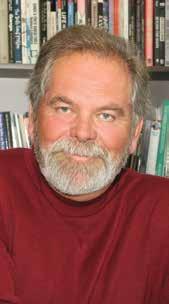

“A professional penman, a copyist, a scribe . . . a Notary.” Thus the Oxford English Dictionary describes a scrivener, the craftsman charged with ensuring that the written affairs of others flow smoothly, seamlessly, and accurately. Where a scrivener must record the files accurately, it’s the Notary whose Seal is bond.
We chose The Scrivener as the name of our magazine to celebrate the Notary’s role in drafting, communicating, authenticating, and getting the facts straight. We strive to publish articles about points of law and the Notary profession for the education and enjoyment of our members, our allied professionals in business, and the public in British Columbia.
Published by the BC Notaries Association
Editor-in-Chief Val Wilson
BCNA CEO Chad Rintoul
Administrative Coordinator Olivia Kuyvenhoven
Courier Lightspeed Courier & Logistics
Production fractal design inc. (fractal.ca)
email: scrivener@bcnotaryassociation.ca website: www.bcnotaryassociation.ca
Send photographs to scrivener@bcnotaryassociation.ca.
All rights reserved. Contents may not be reprinted or reproduced without written permission from the publisher.
This journal is a forum for discussion, not a medium of official pronouncement. The BC Notaries Association does not, in any sense, endorse or accept responsibility for opinions expressed by contributors.
CANADA POST: PUBLICATIONS MAIL AGREEMENT No. 40010827
Postage Paid at Vancouver, BC RETURN UNDELIVERABLE CANADIAN ADDRESSES TO CIRCULATION DEPT.
BC NOTARIES ASSOCIATION SUITE 201, 2453 BEACON AVENUE SIDNEY, BRITISH COLUMBIA V8L 1X7 WWW.BCNOTARYASSOCIATION.CA
The theme for this edition of The Scrivener highlights how significant the relationship is between a BC Notary and their clients.
Many British Columbians get to know their local Notary when they are young adults purchasing their first home. That initial professional interaction often marks the beginning of a lifelong relationship where clients come to trust their Notary to provide them with other noncontentious legal services.
Estate planning and the preparation of a Will pave the way for creating Representation Agreements, Powers of Attorney, and the process of planning and helping to organize the clients’ affairs for the future.
The BC Notaries Association (BCNA) has been advocating for the expanded scope of practice for Notaries so the same Notary who has handled your real estate conveyancing and written your Will can prepare a testamentary trust as a part of your Will and probate your Will when the time comes. Those services are congruent with the work already carried out by BC Notaries. British Columbians are already asking their Notary to provide those additional services.
During November 2022, the BCNA hosted a series of MLAAppreciation Events in Victoria, all excellent opportunities
• to meet with the caucuses of all three political parties in the Legislature;
• to thank MLAs for their service to British Columbians; and
• to educate them on our advocacy initiatives.
We appreciate the time the Members of the Legislative Assembly took to meet with the BCNA Board and Notaries from the Victoria area to learn more about the work BC Notaries do in their communities throughout the province.
I have no doubt that serving as an MLA can be both challenging and rewarding. We greatly appreciate the work they do as they strive to make life better for everyone in our province.
As the Ministry of the Attorney General works toward legal-professions legislative and regulatory modernization, the BCNA will continue to advocate for BC Notaries to be able
• to assist British Columbians with preparing testamentary trusts and life estates;
• to file probate documents; and
• to incorporate and maintain records of BC companies.
We believe all MLAs will agree it is in the public interest to give British Columbians increased access to legal services and a choice when it comes to the provision of noncontentious legal services.
On behalf of all of us at the BC Notaries Association, I wish you a Healthy and Happy New Year!

We are looking forward to upcoming events, including
• the New Notaries Career Fair on February 11, 2023, a virtual opportunity for students in the Simon Fraser University Master’s degree in Applied Legal Studies Program to meet potential future employers or business partners, and
• of course the long-awaited return to our Annual Continuing Education Conference taking place in Kelowna, April 21 to 23, 2023. We look forward to seeing you there! s
Respectfully Chad Rintoul, Chief Executive Officer
Estate planning and the preparation of a Will pave the way for creating Representation Agreements, Powers of Attorney, and the process of planning...
Iam
to Fall . . .

Summer seemed to last forever (that’s for all of you who saw Bryan Adams in Vancouver in November), then, suddenly, it was Winter. Here’s hoping Winter is short and Summer comes back early.

In this exciting issue, we delve into the topics of Personal & Estate Planning and Medical Assistance in Dying (MAiD).
Notaries Public have been providing legal advice to British Columbians around their estate plans for decades by preparing Wills, Representation Agreements, Advance Care Directives, and Powers of Attorney. Further, when Notaries are setting up Tenancies on property transfers, they are simultaneously working with clients on estate planning.
British Columbians are so appreciative of the assistance BC Notaries provide them and really look to the profession to provide sound legal advice they can understand. People are looking for Estate Planning assistance; BC Notaries provide that advice and the legal documentation that goes with the advice.
• British Columbians need to appoint a person to help manage their financial

affairs . . . Notaries advise and prepare the Power of Attorney.
• British Columbians need someone to assist with their future health and their personal care . . . Notaries advise and prepare the Representation Agreement and the Advance Health Care Directive.
• British Columbians want to be sure their estate will properly disperse to their loved ones when the time comes . . . Notaries advise and prepare the Last Will and Testament.
The other theme for this Scrivener is Medical Assistance in Dying (MAiD). MAiD became law in Canada in 2016 with the passing of Bill C-14 after the Supreme Court of Canada made its ruling that criminalizing the assistance in another person’s death violated the Canadian Charter of Rights and Freedoms. That was known as the Carter v. Canada case. Many may remember Sue Rodriguez who first took on the Supreme Court back in the early 1990s. Sue had ALS and wished to end her own suffering.
MAiD is now legal in Canada; the law permits its use only in a very narrow set of circumstances and only after specific criteria have been met. Further changes came into force in early 2021 that included enhancements to eligibility
and safeguards to protect those wanting to access MAiD.
One of the best places to get information on end-of-life matters is through your local Hospice organization. I had the pleasure of serving on the Board of Directors of a new startup Hospice society in Delta known as the Heron Hospice Society of Delta. Hospice societies provide compassionate care to individuals facing lifelimiting illness and support to those who are grieving the loss or imminent loss of someone close to them. I consider Hospice organizations an integral part of our health care system. We all have seen recent emphasis on managing people’s emotional health and the benefits it can bring to our quality of life. Hospice organizations provide that critical mental support we all need when dealing with grief.
Hospices are often set up and operated as not-for-profit societies with charitable status. That means they operate without significant government funding and rely on members and donors to support the critical work they do.
I encourage you all to reach out to your local hospice and learn about the work they do and then consider becoming involved as a volunteer and/or a donor.
I hope Spring arrives quickly!
not sure what happened
The articles in this issue will help you know more about
• Personal & Estate Planning (to protect the assets you do have);
• the legal documents you need; and
• the process for updating those documents over time.
It is always better to consult an experienced legal professional when you decide to create or update your Will, Representation Agreement, Advance (Health Care) Directive, and Power of Attorney. (WRAP)
That will help ensure that the clearly stated intent, instructions, and wishes in your documents will prevail.
To create those important legal documents, confer with and trust a BC Notary with the details about your family and estate situation. BC Notaries really care about helping their clients ease the sting of making decisions that may be causing personal stress or confusion.
It is essential that you have serious conversations with your
loved ones about legal planning. Enter the conversations with an open mind.
Here is a delightful story about a loving grandma whose family members were very reluctant (in fact, refused) to discuss her eventual demise—and also their own. She invited them all to dinner at her home. When they arrived, Grandma made it very clear that the family was about to hear the plans and wishes she had stated in her Will and other planning documents. She also announced that talking about their own Wills was a required activity that day! “Do you want dessert?”
When they saw Grandma was totally serious about the Wills subject, one by one they agreed to comply! Her happiness was very important to each of them.

Welcome to our new writer, BC Notary Jeremy Andersen, CPA, MBA, for the topic of Tax. His first article is on page 64.
Do it NOW!
This true story is about two close friends in their 40s who delayed creating the legal documents that would protect their interests.
John lent David $200,000 to start a business. The loan was totally undocumented. “I will have the legal docs prepared next week to show that I owe you that money,” David assured John. The next day, David perished in a tragic highway crash. John was left to grieve the death of his buddy and the foreverlost $200,000.
This year it will become fashionable for people to be kinder to each other, tell the truth, stop labelling/ criticizing others, and to better accept individuals who are different.
Let’s espouse the values of kindness, courtesy, consideration, appreciation, and respect—and apply them liberally throughout the New Year! s
Val Wilson, Editor-in-ChiefEven if you believe you don’t have much of an estate, it’s important to make a Will.
One of the first acts of ancient peoples was to build a system to keep track of time.

That was crucial for the survival of their societies . . . they needed to know when to plant. No plant, no food, no life. They found the fundamentals high up in the firmament and employed the moon and the sun for their earthly endeavours.
As a result they invented the calendar. Our Monday (the moon) and our Sunday (the sun) still refer to the anchor points in the system. That Roman genius Julius Caesar most famously reformed the calendar in a form still known to us. One month (yes, there is the “moon” again) was even named after him: July.
He became the first Roman Emperor. In some countries, they used his last name for the top position—the German Kaiser and the Russian Tsar.
The calendar allowed us to plant and to plan. From the Latin agere, to act, we created the agenda, a list of action-items. Both words, agenda and calendar, are used interchangeably these days.
A tool that expanded the system became known through an Arabic word—almanac. Many words
starting with al appear to have an Arabic origin, such as alcohol and algebra. The almanac became a useful manual because it added key information to our calendars—tide tables, planting dates, names of Saints (important for scheduling festivals), and so on . . .
From listing action-items and recording relevant facts to attempting to predict future events was only a small step. But it took a leap of faith.
Astronomy, the study of the stars, led to the pseudo-science of astrology, the interpretation of the locations and movements of the stars. Some believed the constellations (stella, Latin for star) had an influence on human conduct.
Those who portrayed themselves as able to forecast events and provide guidance for future conduct became known as prophets, from the Greek prophesy, to predict. The word predict is Latin. Both words mean to foretell or to forecast.
Arguably, the most famous or infamous was the 16th century seer Nostradamus. The French philosopher wrote during the years of the plague known as the Black Death. Survivors back then desperately needed to hear what else the future held in store and he obliged.
His predictions took him far into the future. They are formulated in such vague terms that still today many credit him with accurately predicting major events.
That was, however, many moons ago. One valuable lesson we can take away from this brief etymological history is: Make hay while the sun shines.
Because it is written in the stars that life does come to an end, as certain as the rising and setting of the sun and the rotations of the moon.
As such, planning for our demise, as well as our diminishing health, should be a priority actionitem on anyone’s agenda. Who wants to leave unfinished business behind?
The British Columbia lawmaker has provided the tools—think Will, Power of Attorney, and Representation Agreement; any BC Notary Public is well-versed in advising you how to use them.

I am not promising you the moon but once your planning documents are in place, you can ride off into the sunset. With no agenda, hidden or otherwise s Notary Public Filip de Sagher is the Manager of Complaints at The Society of Notaries Public of British Columbia.
 Filip de Sagher
Filip de Sagher
Recently I had the privilege of giving a presentation to members of the North Shore Royal Canadian Mountain Police on Personal and Estate Planning. Having firefighters in my family has made me very conscious of how necessary it is for First Responders to have their legal documents organized.
Approximately 50 members of the local RCMP attended the recent lectures offered them through Wellness seminars covering areas of sleep hygiene, career management, fitness, nutrition, lifestyle, Wills and estates, PTSD and burnout, chaplaincy, and general support services.
It seems to me that those on the frontlines protecting and caring for our communities every day are the very people who need to have adequate estate planning in place.
Protecting themselves and their personal family members should also be a top priority in their planning. Police, firefighters, doctors, nurses, and emergency services employees are all occupations where lives are potentially at risk daily, due to their choice of employment.
I was able to provide the seminar attendees with the legal basics on creating and updating records of their assets and liabilities in an Estate Record Keeper. It is essential to know what documents are required in our province for good personal and estate planning.
Police, firefighters,
and
services employees are all occupations where lives are potentially at risk...
• Power of Attorney (granting financial authority)
• Representation Agreement and Advance Directive (both granting medical authority)
• Do-Not-Resuscitate documentation
• Last Will and Testament
Many questions arise when you turn your attention to those basic documents. Based on the scenarios in your individual life, some situations require personal discussions with your trusted legal professional.
It is always important to start with the basics and proceed from
Marg Rankin
there to contact the professionals with the skills to provide specific estate planning advice.
Many individuals don’t know where to start or the relevance of making sure their legal documents are ready. They don’t understand the ramifications of not having a Power of Attorney in place if a person becomes incapable of handling his or her own legal and financial affairs. That can put your next-of-kin in a situation where a Court application to appoint a “Committee” (pronounced comitay in this case) may be necessary to deal with personal assets. That very costly and time-consuming procedure can be avoided by having a current Power of Attorney in place.
A Representation Agreement (to grant medical authority) gives a trusted person (Representative) the ability to make medical decisions if you are unable to make those decisions for yourself. The environment of a hospital or care facility can be isolating.
If you appoint a Representative, you will have a trusted advocate with the legal power to help. Through a Representation Agreement document, the medical authorities have permission to discuss your medical history, diagnosis, and prognoses with the Representative who will be informed and then able to make decisions on your behalf.
doctors, nurses, emergencyA Will is required to appoint an Executor/Trustee, to specify
• the persons who will receive your estate upon your death;
• the people who will be the guardian of any minor children (and pets) you have at your death; and
• what is to happen to your remains.
Without a Will, it would be necessary to apply to the Supreme Court for a Grant of Administration of your Estate to deal with assets registered in your name.
Again, that is a costly procedure requiring the services of a lawyer to prepare the Court application and compile all the required documentation on
• who should be appointed by the Court;
• how to contact your next-of-kin; and
• your assets.
Due to poor or nonexisting records, relevant information is often never discovered.
Although it does take time and effort to organize your life to ensure you and your loved-ones are protected, you will have great peace-of-mind once that has been done!
If you spend months or even years to plan your next holiday, it is definitely worthwhile to spend time to plan for the management of your estate should you become ill, incapable, or die.
Please consult your local BC Notary Public or lawyer for advice on how to get started. It’s worth it! s Margaret Rankin is a Notary Public practising in North Vancouver, BC.
“We’ve ensured our legal and health care wishes will be carried out, should either of us become incapacitated or pass away. Our loved ones will not be burdened by the stress of making our decisions for us.”
Health Care Directive P ower of Attorney

Give the gift of advance planning to your loved ones. Call your BC Notary today. www.bcnotaryassociation.ca (604) 676-8570
Trevor, Jackson and Chuck E. Todd providing excellent legal services in contested wills, trusts and estates for over 50 years. disinherited.com rttodd@disinherited.com | t. 604.264.8470
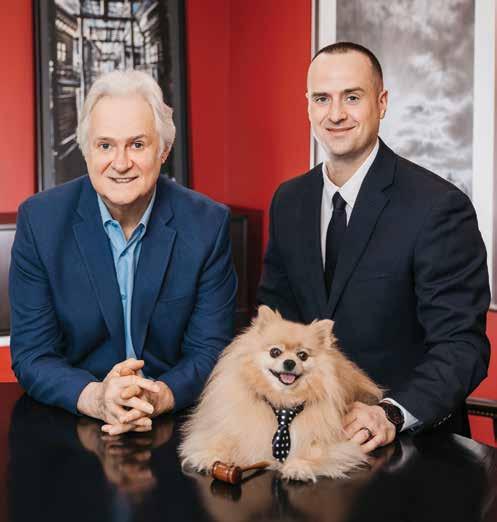
Wills are important documents that speak for you when you are gone.

If you don’t do a Will, your loved ones will have to step in and follow the statutory framework for distributing your estate. Instead, you can take control and make the final decisions by doing a Will.

A Will can dictate to the executor how your special items will be distributed.
Examples . . .
• My client wanted to give his shoe collection to his best friend.
• A client who had an original AY Jackson painting from the Group of Seven wanted to give his oldest grandson the first right to purchase that valuable painting from the estate.
• Another client had two World Series Baseball Rings and wanted to give each ring to a different person.
Life changes—it ebbs and flows—so your Will needs to reflect your thoughts and wishes at the moment.
Morrie BaillieYour Will can include information about how your remains will be managed.
Of course, the common solutions are
• to be buried, or
• cremated.
I draft Wills stating clients want the greenest, most environmentally friendly, and cost-efficient final process available.
Some of the most cuttingedge methods for dealing with their remains include having them converted into mulch in Washington State, USA, then have them scattered in their garden. Unfortunately, that process is not available in British Columbia.
A water cremation is apparently possible in the USA; it is a greener process than traditional cremation. When you don’t have a Will, you leave your loved ones guessing; that generates chaos and can compound grief. I tell my clients that doing a Will is “the grown-up thing to do.”
Life changes—it ebbs and flows—so your Will needs to reflect your thoughts and wishes at the moment.
It is very typical to update your Will as you move through life. For example, you may need to adjust your alternate guardian to be a more suitable person as your kids get older—or you may have fallen in love and want to include your new partner in the Will.
The rule of thumb is to look at your Will every 3 to 5 years; if nothing requires a change, put the Will away and look at it again in 3 to 5 years.
One of the newer trends I see in my estate practice?
Calls from potential clients who have completed an online Will and need support executing or witnessing the document.
In my practice, I do not sign Wills I have not drafted. As BC Notaries, it is our duty to provide legal advice, guide the process to ensure the document is a true reflection of wishes, and that there is no undue influence or outside pressure.
The online platforms offer a simple method to complete a Will for those who are tech-savvy. Those online programs, however, do not



guide the Will-maker or explain the pitfalls of drafting a Will, such as the discussion around excluding a child from a Will or the options available for a child with a disability
They take the time to ensure you understand the entire process; explain the various options available to you, and offer you the time to ponder and reflect before signing your Will.
I recommend you call your local BC Notary to set up an appointment to either review your current Will or start the process to draft a new one. s
Notary Public Morrie Baillie, practising for almost 10 years, exclusively focuses on Personal Planning. One of the statutory examiners for new BC Notaries (Personal Planning), she is a committee member for the British Columbia Law Institute (Undue Influence Committee) and Vice President of the BC Notary Association. Morrie has recently
The rule of thumb is to look at your Will every 3 to 5 years; if nothing requires a change, put the Will away and look at it again in 3 to 5 years.
For example, when I get involved in preparing an estate plan, I tend to spend at least 30 minutes with my clients to understand their values, aspirations, family status, financial situation, and so on, even before discussing any details regarding their Wills.
“Our five children are grown and married and have children of their own. Our eldest passed, leaving a widow and daughter. Our financial planner encouraged us to update our legal documents. Consequently, we met with BC Notary Lilián Cazacu.
Estate Planning is more than just writing your Will. The majority of my Wills clients approach me with one request: “I just need a simple Will.” As many of my Notary colleagues may attest, there is no such thing as a simple Will.
While family dynamics may vary from home to home, and some situations may require a more or less straightforward Will and estate plan, most people require forwardthinking discussions and an analysis of their family dynamics, their assets and liabilities, and even the goals and dreams that may affect the way they would ideally plan their estate distribution.
I’m still amazed by how people invest so much time and resources into their financial planning, by researching and planning extensively, where and how to invest their money, but when they approach estate planning, they’re looking for a “pill” to give them peace of mind for the time being.
A good homemade meal requires considerably more preparation time than your favourite fast-food. Similarly, a proper estate plan requires some intentional planning from the clients and the Notary practitioner.
Having a quick Will prepared could give you some peace of mind, but won’t provide you with a bullet-proof estate plan that will cover all the bases.
To make sure someone has all their “ducks in a row,” their estate plan should include all the areas of their life, such as accounting, investing, tax, and family-relationships dynamics. My approach in preparing our clients’ estate plan is to work in tandem with the clients’ other professionals such as their accountant, tax advisor, financial planner, and lawyer, so the estate plan accomplishes the clients’ goals from all those points of view.
I’m very passionate about solving challenging estate puzzles and rarely find an estate plan to be a straightforward solution. Moreover, instead of seeing “Will-making” as a one-time solution to all the estate planning needs, I prefer to look at an estate plan as a beautiful, diverse puzzle where the Will and Power of Attorney documents are just pieces of the big picture that is comprised of various day-to-day decisions, such as the way they decide to register their names on the title of their home.
Therefore, our final product is a custom-made, thorough estate plan that ultimately accomplishes our clients’ goals, such as helping protect their estate from any future legal battles or family discord, save taxes if that is possible, and even mend their struggling family relationships.
Ken and Gabriela P. (Lilián’s clients) “We became a ‘blended’ family 31 years ago. Finances were tight so we arranged a very simple Will through a volunteer service offered by a local church.
“We had a great in-depth assessment of our situation at Lilián’s office before proceeding to the drafting of any documents. Eventually, the division of our estate was tax-efficient and according to our specific situation. That could not have been achieved with a quick Will-drafting or by one of the “DIY” Will kits.
“Since major financial assets are held jointly and pass to a surviving spouse, the share arrangement covered the eventuality of joint demise and describes disbursement of remaining assets to the surviving family members.
“While we are a very close-knit family, all those arrangements were made to preclude any future conflict among our children.
“Therefore throughout all this painless process, our goal of wise planning to minimize additional pain and stress upon our demise has been achieved! To that end, our Notary has provided necessary and crucial help.”
Barry and Doris knew a,bout the Variation Act clauses in WESA (Wills, Estates and Succession Act, [SBC 2009] and resented the fact that the Court could change their Wills

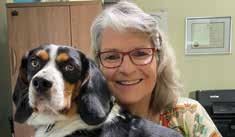
on terms it thought appropriate. They felt they didn’t need Wills because they didn’t have much and the Court could intervene, anyway. But once they understood the lengthy BC Supreme Court process for applying to be an Estate Administrator for intestate deaths, they agreed it was better for their loved ones if they died with a Will than without one.
Forty-five-year-old Luba was on edge when she entered the office with her ageing parents. They had “Make a Will” on their bucket list and wanted to clear it off. Luba was an only child and even the contemplation of her parents’ death brought her to tears. But listening to her parents get deeply involved with the Will interview process prompted her to compartmentalize her grief and get involved with their planning that featured her significantly as their personal representative, trustee, and sole beneficiary.
Mandeep presented as a 40-ish woman who was well-established
financially and professionally. She wanted to do a Will but did not have a relative in the world! Her parents were deceased and she had no siblings, spouse, or children.
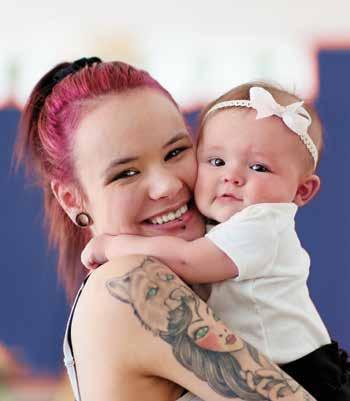
Mandeep had decided to have a trust company be her executor. We talked about how trust companies cannot charge more than the standard 5 per cent executor fee but many also charge administrative fees for every transaction they facilitate, including property sales. She agreed she could broaden her thinking about who could do that task for her, and perhaps see if any of her trusted colleagues at work would consider being her executor.
Adrienne and Andrew were in their early 80s. She was very wealthy, he less so. She wanted to leave him money to safeguard his accustomed lifestyle, but her strategic objective was to protect her legacy and ensure her wealth largely passed to her three daughters from her first marriage.
The ratio of women-to-men in Andrew’s age bracket in Kelowna is about 2:1. Adrienne worried that if she died first and left her estate under Andrew’s stewardship, he could be manipulated into another marriage; his new spouse (the “key risk”) would then take control of Adrienne’s money.
Adrienne’s current Will had set up a life estate and trust, which she felt could not defend against the key risk. I suggested an “Andrew Fund” (the “Fund”) to be administered by one of her daughters in collaboration with Andrew. Adrienne liked that idea but was concerned that if the Fund should grow over time, it would be a target for the key risk. Ultimately I believe she will leave three quarters of her money to her daughters and have the daughter who is executor receive and manage the fourth quarter as an “unofficial fund” for Andrew on a monthly basis until he dies. Thus Adrienne’s wealth would not be visible to anyone else. s
Let’s face it; no one wants to ponder his or her own morality.
More often than not, that means estate planning permanently rests at the bottom of the priority pile. Yet having an estate plan is about much more than death and taxes.
It’s about people. . . you and the people you care about. It’s about planning for those “what ifs” along your ageing journey.
• What if you die?
• What if you get injured or incapacitated?
• What if you become dependent?
Having a good estate plan starts by asking questions. The more you learn about what you want and how you can facilitate your wishes, the easier it is to move your estate planning to the top of your “to do” list.
I am always hopeful but never surprised at the lack of waving hands when our workshop presenters ask attendees, “Who has their estate planning documents in place and recently reviewed?”
There’s inevitably a multitude of reasons why not, but the answer that always resonates the most with me is this: “It’s so complex and I didn’t know where to start.”
But then I’m hopeful again because our estate planning workshops are always full and education is a great first step.
Here are five things you can do to get started.
• To get information about the planning process and documents, see if seniorserving organizations in your community are offering any free estate-planning information workshops.
• Make a list of questions for your BC Notary, financial advisor, and accountant.
• Talk with your loved ones so they are clear about what you want.
• If you don’t already have your team of professional advisors in place, ask friends and family for recommendations; then make a list of interview questions to help you choose the professionals who are right for you.
• Be curious. You don’t know what you don’t know, until you know what you should have asked!
The Eldercare Foundation believes strongly in the value of providing free education to help people navigate the journey of ageing. We engage experts from the health care, financial, and legal professions who gladly volunteer their time to lead free estate and financial planning workshops at the Wellness Centre, Adult Day Programs, and extended care facilities Eldercare supports.
Take a look to see what is available in your community.
If you haven’t gotten around to documenting your estate plan yet, don’t wait until that “what if” happens and your world is turned upside-down.
Armed with your list of questions and some basic knowledge, you’ll find it much easier to engage the right professionals to ensure that your estate plan reflects you and your wishes. s
Lori McLeod is Executive Director of Eldercare Foundation in Victoria, BC.

I am always hopeful but never surprised at the lack of waving hands when our workshop presenters ask attendees, “Who has their estate planning documents in place and recently reviewed?”
Legacy gifts power the possible.
With community members across BC leading the future with their values-based decisions, our children and grandchildren have more of a chance to fulfill their hopes and dreams.
BC Children’s Hospital Foundation receives legacy gifts from all corners of the province. We appreciate how our communities, through legacy gifts, recognize the vital medical treatment that their neighbourhood kids have received and how those children’s lives were saved or significantly improved.
Just think of how childhood cancer survival rates have changed in the last 50 years from 20 to 80 per cent. Significant strides in addressing childhood disease take place because thoughtful donors create their legacy gift by thinking ahead. We don’t rest on our laurels. The 20 per cent of children not surviving cancer are the propelling force for our researchers because every single child lost to the disease is one too many.
Children are 100 per cent our future. BC Children’s Hospital is the sole pediatric hospital in our province; all children with complex care needs are treated at BC Children’s.
In 2021 more than 138,000 kids from all across BC received expert care. Personalized medicine means each child receives treatment
tailored to their medical situation. That often encompasses a unique collaboration between our physicians and researchers, what we call “bench to bedside,” where research in the lab can provide clues to a novel medicine that specifically targets the child’s illness.
Our site is home to a research institute, acute care hospital, and mental health and rehabilitation centres, so each child benefits from a seamless care experience.

BC’s kids don’t go it alone, nor does our community of donors, fortunately. Notaries across our province understand the power of legacy and how the smallest community-members have the potential to be as mighty as adults.
Smithers exemplifies a community where our Notary friends have provided exceptional guidance to ensure that a loving legacy of care became reality. A leading Notary provided seamless services to ensure that donor intent was expressed accurately within a Will. Communities benefit from friendly conversations where thoughtful dreams are birthed in the accuracy of Will clauses.
A well-known Notary in Victoria not only assisted donors with their Will language, she took a further step to create her own future legacy to help tomorrow’s children. I could mention Chilliwack, Surrey, Kitsilano, and many more locations where BC Notaries help create a healthier future.
Our Foundation’s Legacy Team is available for in-depth conversations around areas the donor may wish to support. Our donors have told us that those conversations are vital starting points as they explore ideas, consider some pitfalls, and simply need an unbiased listening ear before heading to their BC Notary.

Based on insights from estate administration, here are my top three tips for any future legacy donor.
1. Engage the services of legal professionals who have a track record of estate planning to give you advice on various options that take care of your family and navigate any difficult circumstances you may foresee for the future.
2. Look at your current or anticipated wealth and think about the joy you could experience today, by giving to make a difference.
3. Activate tax benefits now. Our greatest joy is to thank donors. It is best summed up in the words of our Legacy Circle member who wrote after our recent Appreciation Tea, “I could feel and hear—in the voices of the care team—the love they have for each child. It was absolutely heart-warming—tears came to my eyes.”s
Hilary Beard is the Director of Gift & Estate Planning at BC Children’s Hospital Foundation.
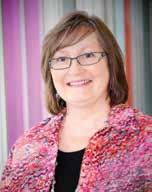 Hilary Beard
Hilary Beard






The BC Law Institute (BCLI) has
documents.
Many Scrivener readers will be familiar with the original version that has been listed for a number of years as a practice resource on the websites of both The Society of Notaries Public and the Law Society, and used in teaching Notarial candidates in the Master of Arts Program in Applied Legal Studies at SFU.
The new version with the shorter title, “Undue Influence Recognition and Prevention: A Guide for Legal Practitioners” (the “new BCLI Guide”), has been revised and updated to reflect changes in law and practice since the original version appeared in 2012.
In particular, they include remote execution and witnessing of Wills, Powers of Attorney, and Representation Agreements by audiovisual technology, electronic Wills, and increased use of videoconferencing generally in legal practice in the postpandemic era.

The Notary Foundation funded the development of both the original and updated versions of the BCLI Guide; prominent members of the BC Notary profession played an important role in the process at both times.
Notaries Laurie Salvador and R. H. (Rick) Evans served on the counterpart committee that developed the original Guide.
The Project Committee, assembled by BCLI to assist in the revision and updating of the Guide, brought interdisciplinary expertise to bear on the exercise. Its members had extensive knowledge and experience in law, medicine, social work, psychology, and risk management. In the course of the project, BCLI and the Project Committee consulted with
• the professional governing bodies and professional associations;
• leading practitioners with a special interest and expertise in undue influence; and
• numerous community and national organizations with mandates related to the purposes of the Guide.
issued a new version of its Guide on recommended practices for dealing with potential undue influence surrounding Wills and other Personal Planning and EstateNotaries Morrie Baillie, Patricia Fedewich, and Hilde Deprez served on the Project Committee that developed the new BCLI Guide.
The list of “red flags” that should factor into a legal practitioner’s awaremess that undue influence might be in operation has been expanded in the new BCLI Guide to cover nonverbal cues more extensively with appropriate cautions, and new points specifically associated with videoconferencing in client communications.
The chapter entitled “What Is Undue Influence in Fact?” contains additional information on the medical and psychological aspects of undue influence, while the chapter on the law of undue influence covers nontestamentary undue influence more extensively.
Intercultural communication is another area expanded in the new BCLI Guide. Undue influence is a sensitive subject to address with any client and differences in language, attitudes, outlook, and family dynamics between and among cultures can make it much more so.
The new BCLI Guide informs legal practitioners of cross-cultural matters they need to bear in mind
when communicating with Indigenous clients, those belonging to other cultural communities, and their supporters.

Suggestions are made for conducting cross-cultural communication that is both respectful and effective in situations when practitioners find it necessary to explore the possibility that drafting instructions do not represent the client’s true wishes, but instead those of someone exerting undue influence on the client.
The new BCLI Guide contains an updated version of the popular Reference Aid consisting of a checklist that can be used in conducting client interviews and a flowchart.
As before, the Reference Aid is also being made available as a separate publication. Like the original version, the new BCLI Guide is available free of charge in PDF format or in print. The PDF may be downloaded from the BCLI website at www.bcli.org. s
Gregory G. Blue, KC, is a Senior Staff Lawyer for the British Columbia Law Institute.
The chapter entitled “What Is Undue Influence in Fact?” contains additional information on the medical and psychological aspects of undue influence...


An Advance Care Plan
(ACP) is a helpful tool that walks you through questions and considerations having to do with emergency and end-of-life care. The purpose of the ACP Kit is to help you get in touch with and express your wishes regarding your future health care decisions.
Those wishes and details can then be included in the creation of specific legal documents.
• Section 9 or Section 7 Representation Agreement
• Advance Health Care Directive
Note: At the present time, Medical Assistance in Dying (MAiD) cannot be included in those documents.
• Power of Attorney or Enduring Power of Attorney
If you have a Representation Agreement, you will have chosen a Representative to make some decisions on your behalf if you become incapacitated, Your Representative should be a person very familiar with your beliefs, values, and wishes regarding your future health care treatment so

he or she can make an informed decision based on what you would want in the situation.
3. Parent (either, may be adoptive)
4. Brother or sister (birth order doesn’t matter)
5. Grandparent
6. Grandchild (birth order doesn’t matter)
7. Anyone else related to you by birth or adoption
8. Close friend
9. Person immediately related to you by marriage (in-laws, stepparents, step-children, etc.)
If you know you would want someone lower on the list to be your TSDM, you should legally name that person as your Representative in a Representation Agreement. It is recommended that you choose an alternate Representative as a backup. The person(s) you choose must agree to be your Representative.
If you don’t have a Representative, a temporary substitute decision-maker (TSDM) will be chosen by your medical team. According to BC law, one individual must be approached— in the following order.
1. Your spouse (married, common law, same sex—length of time living together doesn’t matter)
2. Son or daughter (19 or older, birth order doesn’t matter)
Two types of Representation Agreement formats are in use in British Columbia. The BC government has specific Representation Agreement templates available, although some lawyers have developed their own formats; the completed forms must be witnessed by two people. Only one witness is required if the witness is a member-in-goodstanding of The Society of Notaries Public of BC or a lawyer.
The Section 7 Agreement allows the Representative to make personal care and some health care decisions as well as basic financial decisions. It does not allow the Representative to accept or refuse life support or life-prolonging medical interventions.
Both types of Representation Agreements are available
• online in the BC Government publication, “My Voice: Expressing My Wishes for Future Healthcare Treatment,” and
• through your local BC Notary and lawyer.
Most people appoint a Representative through completing a “Section 9 Enhanced Representation Agreement.” That legal document allows the adult to name a person who can make personal care decisions and some health care decisions for the adult, including decisions to accept or refuse life support or life-prolonging medical interventions.
Less common is the “Section 7 Standard Representation Agreement” that allows an adult with a lower level of capability— due to a developmental disability or injury/illness of the brain that affects cognitive ability—to do some advance planning. The Section 7 Agreement allows the Representative to make personal care and some health care decisions as well as basic financial decisions. It does not allow the Representative to accept or refuse life support or life-prolonging medical interventions.
This question often arises: How will hospital health care teams know you have a Representation Agreement and a Representative and/or an Advance Health Care Directive?
We advise the following steps.
1. Have vital conversations with your loved ones, your Representative, and your health care team.
2. Complete a Representation Agreement. Provide a copy
of it and your Advance Health Care Directive to your Representative and your primary health care provider. Ask your Representative to take those documents to the hospital when the time comes.
3. Paramedics are trained to look on the fridge for important medical documents. Either put your Representation Agreement and Advance Health Care Directive on the fridge or put a note on the fridge indicating where those legal documents can be found by the paramedics.
4. Ask your family physician to scan your documents and put them in your medical file.
5. You may also wish to upload those documents to a central repository, such as Nidus.ca or CARP Health 360.
Connie Jorsvik, a Vancouver-based BSN health care navigator and owner of Patient Pathways, offers detailed advice and guidance in her book Advance Care Planning, in which she states, “Advance care planning is for all adults of all ages and all stages of health. The earlier we begin those conversations, and the planning that goes along with them, the more natural, less scary, and less fraught with emotion the planning process is.”
Make sure to revisit your legal documents and ACP Kit every 3 years or when your medical situation changes. Most important, make sure the people close to you are aware of your values and wishes. Choose a Representative who will honour them. s
https://www.dyingwithdignity.ca/ education-resources/advance-careplanning-kit /
Alex Muir is Chair, Metro Vancouver Chapter, Dying With Dignity Canada (www.dyingwithdignity.ca).

There are two certainties in life, one is birth and the other is death. Both have a celebration and a gathering of friends and family. Both events inspire emotions in our lives . . . happiness with a newborn child or sadness in the case of death.

The natural order of life is parents pass away before their children. As parents, we nurture, love, educate, and care for our children for many years as we watch them grow into young adults with the hope that someday, they too will become parents, completing what is commonly called “the Circle of Life.”

But when the natural order is altered, either through illness or accident, parents endure the greatest hardship of all, the death of their child. I joined that group of parents 2 years ago last July, when my 29-year-old daughter passed away after a year-long struggle with cancer.
When Sydney was young, our family trips to China, England, Ireland, and the Jersey Channel Islands sparked her sense of adventure, leading her postgrad to South East Asia and Australia on a solo journey that had been her dream for many years.
Sydney was in the prime of her life. She met her soulmate Darragh while travelling in Cambodia and they ended up living in Sydney,
Australia. After a year together, the couple took a Christmas trip to Ireland to meet his family.
In early 2019 while living and working in Australia, Sydney began feeling unwell. She was diagnosed with cervical cancer. Her diagnosis brought her home to Vancouver to live with my wife Mary and me.
It was a challenging time. She started radiation and chemotherapy. When her results continued to come back with increasingly serious results, I don’t think she was ready to hear it; she had no point of reference that would have allowed her to accept the severity of that type of news.
Sydney didn’t accept the fact that her cancer was terminal and did everything in her power to fight the inevitable. The cancer metastasized early and her treatments became life-extending rather than life-saving.
I had long accepted the eventuality of her passing and knew that at any time things would take a turn for the worse. We managed at home for a while. Several trips to
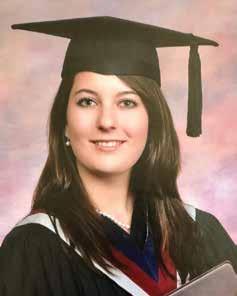
emergency, and an extended stay in the hospital, made it clear that Sydney needed to be admitted to the local Victoria Hospice in the Richmond Pavilion at Royal Jubilee Hospital where they could help her manage her complex symptoms and pain.

I know she didn’t want to go. It was hard for her to be moving to a place where people were dying when all she wanted was to get better and live many more years.
Due to complications and the need for postsurgery monitoring, Sydney’s end-of-life care took place in acute care at Victoria’s Royal Jubilee Hospital with the constant support of the Palliative Care Team. She received the gifts of kindness and compassion from the staff and had the care she truly needed. We were touched by their genuine and amazing dedication.
I am sure parents living with and caring for their children, as they fight for their lives with a terminal disease, struggle with helping their child prepare for their passing. I know it was the hardest thing to broach the subject, never mind complete the work.
Having been executor for both my parents, whose Wills and legal affairs were up to date, I knew what had to be done. But this was different . . . this was my daughter and she was not ready to talk about dying or anything to do with it. That included her Will. That discussion just wasn’t part of her daily mindset.
Of all the responsibilities we have as a parent, beyond all the decisions and advice we provided in their lives, having our children create a Will so their affairs can be wound up in an orderly fashion is so important and necessary.
As Sydney’s health deteriorated and her medications were increased to bring comfort and rest, I
consulted my friend and BC Notary to ask for help to prepare her Will. I knew it would be a difficult time emotionally, when I would be needed to perform the least desirable duty as a parent, but it was one duty I felt obliged to do.
Sydney did finally acknowledge the extent of her condition and calmly drifted into a peaceful, life-ending sleep. She passed away comfortably in Palliative Care with her partner and her family present. Our brave and loving daughter, sister, and partner Sydney was in a wonderful place for her final days of life.
The last night I spent in the hospital, we had only a few moments when Sydney was awake. Her last words to me were, “I love you, Dad.” That’s the best wish anyone can have fulfilled, to be loved . . . and I was.
Hoping Sydney would make it to her next treatment, Mary and I had signed onto a waiting list for a care dog to support Sydney. News of the pup’s birth came within days of Sydney’s passing.

Some children and young adults are able to accept their fate and communicate and share stories and memories with their parents, helping them transition to accepting the day their child will pass. But my daughter would not do that and I suspect many young adults fall into that category.
Sydney and I never talked about her dying. She spoke only of getting better, living her life with her partner, and someday maybe being a parent herself. I wish I could have shared a few stories and relived the happy times. I wish I could have laughed one more time with her.
I wish I knew where to spread Sydney’s ashes—where that happy place would be. But I was able to do what is the most important step—secure her wishes and complete the signing of her Will. That allowed me to carry out my duty as her executor and her father. Getting the Will signed brought me some much-needed peace of mind.
Mary and I proceeded with the adoption and brought home Dylan, a bouncy black Wheaton TerrierPoodle—a ray of light at the end of a dark tunnel. We feel like a hole in our hearts is being filled. He is most loving and affectionate and he lifts our spirits daily with his playful antics. I believe Dylan has Sydney’s spirit in his wee soul.
I trust that sharing our family’s care journey will ease the fear and mystery about palliative and end-oflife care for patients and caregivers finding themselves on a similar path. s
James Spack is a former Technology and Marketing Consultant to the BC Notaries Association. Sydney 2017 Pilates Studio Office Manager, West Vancouver
Palliative and hospice care teams assist patients to find peace and calm in their final days.
People should understand that those specialized care teams deliver endless amounts of comfort, care, and love with a heartfelt passion for helping their patients.
Definitions of Palliative and Hospice Care

Palliative Care is an approach that improves the quality of life of patients—adults and children— and their families who are facing problems associated with serious and/or life-limiting illness. It prevents and relieves suffering through the early identification, correct assessment, and treatment of pain and other problems, whether physical, psychosocial, or spiritual.
Palliative care uses a team approach to support patients and their caregivers. It offers a support system to help patients live as actively as possible until death.
ultimate goal of hospice palliative care is to provide a refuge where patients and families can focus on being together through to endof-life, with the support of specialized care teams and volunteers.”
Hospice Care (sometimes known as “hospice palliative care”) is whole-person care that lies within palliative care for those at the end stage of a life-limiting illness, when life expectancy is weeks to short months. An interdisciplinary team that includes specially trained hospice volunteers provides clinical care and comfort, addressing specific physical, psychological, social, spiritual, and practical issues with a focus on quality
of life through to death and into bereavement for the families.
In hospice, the furnishings and lighting are more home-like, less clinical, and the pace is decidedly different than an acute hospital ward. According to Jill Gerke, Island Health’s Director for Palliative and End-of-Life Care, having dedicated hospice spaces across Vancouver Island has been a key priority for Island Health.
“Over the last year in particular, through partnerships with local community hospice organizations, we have been able to increase the options for specialized end-of-life care for patients and their families through the increase of hospice beds in Victoria Hospice and the new Cowichan Hospice House in Duncan,” notes Gerke.
“The ultimate goal of hospice palliative care is to provide a refuge where patients and families can focus on being together through to end-of-life, with the support of specialized care teams and volunteers.”
“The
Palliative and end-of-life care providers are uniquely kind and caring individuals who provide understanding, peace, and compassion that keeps the dignity of dying in the hands of the person and the family.
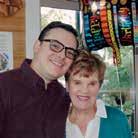
Dr. Jody Anderson, Medical Director for the program at Island Health, says quality end-of-life care doesn’t just address the patient’s care needs; it addresses the fundamental need of families to know their loved ones are safe and comfortable, and not in pain.
“Our palliative care teams are well aware that when someone has a life-limiting illness, it can be overwhelming for the patient and their loved ones,” says Anderson. “Our role is to provide practical support to all involved to help them navigate one of the most difficult experiences of their lives, as painlessly as possible. It is a privilege to care for patients and their (chosen) families at this time.”
Both palliative care and hospice care are offered by specialized teams in hospital, long-term care, hospice settings, and in an individual’s home. s
For more information www.islandhealth.ca/learn-abouthealth/end-of-life-care-hospice
Audrey Larson, a communications and engagement consultant with Island Health, is grateful to live, work, and learn in Coast Salish territory. Audrey believes wholeheartedly in the power of collective impact and strives to support community connections that create better health for all.
We have cited parts of Audrey Larson’s article published in Island Health Magazine, Spring 2021, by Island Health Communications.
You and your clients can help end animal cruelty and comfort animals in need. Contact us today to learn more about how they can leave a gift in their Will.

Charitable Number: 11881 9036 RR0001
Clayton Norbury cnorbury@spca.bc.ca 1.855.622.7722 ext. 6059 foreverguardian.ca

This year, help them plan to share their everlasting love.

As most practitioners will be aware, federal legislation in the form of amendments to the Criminal Code of Canada, (i.e., the Medical Assistance in Dying Act, S.C. 2016 c.3), that provides for medical assistance in dying (MAiD) has been in place since 2016.
The legislation was amended in March 2021 by the Criminal Code (Medical Assistance in Dying) Amendment Act, S.C. 2020, c.2 (a.k.a. Bill C-7) to allow access to MAiD for those whose death is not imminent but who otherwise qualify for the procedure. In 2019, the original and more restrictive provisions that required a natural death be reasonably foreseeable before MAiD could be provided were found to be unconstitutional by the Quebec Superior Court (see, Truchon and Gladu v. the Attorney General [Canada] and the Attorney General [Quebec] 2019 QCCS 3792), and the Court ordered the governments of Canada and Quebec to change the offending provisions of their legislation. The Court held that the provisions violated sections 7 (life, liberty, and security of the person) and 15 (equality) of the
Canadian Charter of Rights and Freedom, and could not be justified under section 1 of the Charter. The governments of Canada and Quebec subsequently changed the offending provisions of their legislation.

on MAiD time to consult, consider, and resolve a number of significant issues only one of which is the vexed issue of a mentally disordered adult’s capacity to request MAiD.
At the time of writing, the March 2023 expiration date has not been changed despite the opposition mounted by some health care providers who want more time to prepare. There is some indication the federal government is listening to the concerns; the sunset clause, section 241.2(2.1) of the Act, may be extended when Parliament resumes in 2023.
The amending (2021) legislation has created a twotrack system for MAiD requests based upon whether or not an adult’s natural death is reasonably foreseeable. In a nutshell, if a natural death is reasonably foreseeable, the procedure contains fewer obstacles than if it is not reasonably foreseeable. The legislation has also addressed the issue of whether MAiD should be available to an adult who is experiencing a mental disorder, (i.e., a mental illness), as their primary underlying condition. Adults with mental disorders have been temporarily ineligible for MAiD for a 2-year period, expiring March 17, 2023. That has allowed the Special Parliamentary Joint Committee
According to the most recently available Health Canada Annual Report on MAiD, (i.e., the third Annual Report, released in 2022), there were 10,064 MAiD deaths during the 2021 calendar year. By the end of that year, there had been a total of 31,664 MAiD deaths (since 2016) and the procedure had been used in every Canadian jurisdiction. In the vast majority of cases, assistance has been provided by physicians (especially family practitioners) and (to a lesser extent) nurse practitioners, with a minimal number of (permissible) self-administered deaths using prescribed medications. Those interested in a wealth of detailed information about the practice of MAiD in Canada are urged to read the Health Canada report.
Those interested in...the practice of MAiD in Canada are urged to read the Health Canada report.
The evident popularity of MAiD is reflected in the steady rise in MAiD deaths as a percentage of all deaths in the country. British Columbia is a province with one of the highest percentages of such deaths each year. By 2018, the BC percentage of MAiD deaths stood at nearly 2.5 per cent compared with the national average of 1.5 per cent. The BC percentage had risen to 3.3 per cent of all deaths in Canada by the end of 2021.
The popularity of the procedure is a welcome development for many but it is also creating some logistical and other problems. In October 2022, the National Post pointed to access problems caused by a national shortage of MAiD practitioners. Apparently, many were stepping away from involvement because of the perceived moral hazards associated with the ever-widening eligibility criteria including the fear that MAiD requests were being driven by social and economic, rather than purely medical, factors. In this regard, concerns have been raised about the possibility that some staff working with Veterans Affairs have suggested MAiD as an option to clients seeking additional services.
Regardless, MAiD is clearly the procedure of choice for many older Canadians who wish to end their lives because of intolerable medical conditions. According to Health Canada, the age range of participants was 56 to 90 years (the average age was 72), and they were almost evenly split along gender lines (51 per cent were men). Cancer-related illnesses were the most frequent reason for seeking MAiD but some participants had unbearable neuro-degenerative disorders, (e.g., Alzheimer disease), and some were suffering from severe, unbearable circulatory/ respiratory conditions.
As most readers will be aware, the MAiD provisions in the Criminal Code intersect with provincial health care consent and related legislation and, probably more important, for British Columbia, the legislation governing the creation and use of Advance Health Care Directives as well as Representation Agreements for health care and personal care decision-making. It is highly likely that the latter instrument will be favoured by those who want to plan for MAiD in the Province because of the numerous safeguards built into that legislation, the existing and widespread popularity among users, and the levels of familiarity on the part of both medical and legal practitioners. We are not yet at the point where the option is permissible for those seeking MAiD but it is clearly under active consideration.
The issue of advance requests for MAiD including Advance Directives and other instruments for planning for future health and personal care has been addressed by the federal government. The latter, wisely, commissioned the independent Council of Canadian Academies to create expert panels to examine and provide reports (but not recommendations) in three important and controversial areas.
1. Whether MAiD should be available to “mature minors”
2. The issue of Advance Directives/ planning, especially in the case of mentally competent adults in the early stages of, for example, neuro-degenerative disorders such as Alzheimer disease or Amyotrophic Lateral Sclerosis
3. The situation affecting individuals who are suffering from mental disorders who seek MAiD
The commissioned work was completed, and the required reports were submitted to the federal government at the end of 2018, with the hope that those (and other) issues would be addressed as part of the mandatory review of MAiD in the Spring of 2020. No one anticipated the impact of the COVID-19 pandemic that has frustrated a number of legislative and policy initiatives at both the provincial and the federal levels. At the time of writing however, (November 2022), the MAiD review appears to be well under way through the Joint Parliamentary Committee on MAiD.
When it is permissible, there will be an obvious impact on legal practice, including Notarial Practice. Existing clients will likely seek to add specific MAiD clauses to their incapacity planning documents and new clients will likely seek assistance with the creation of new documents.
While the focus has been on those with mental disorders, (primarily because of the Truchon decision), it is highly likely that advance planning, (e.g., Advance Directives), will be the next item under consideration. That is because of the apparent popularity of the option and the potential
Regardless, MAiD is clearly the procedure of choice for many older Canadians who wish to end their lives because of intolerable medical conditions. According to Health Canada, the age range of participants was 56 to 90 years (the average age was 72), and they were almost evenly split along gender lines...
for a fusion of existing provincial personal planning legislation with the new federal legislation governing MAiD.
At the same time, in British Columbia the fusion will not be as simple as adding MAiD provisions to existing statutes such as the Representation Agreement Act. The federal legislation requires that a person seeking MAiD be an adult, (i.e., at least 18 years of age). The relevant provincial legislation in BC, (and some other jurisdictions), sets the age of adulthood at 19; and that affects both Representation Agreements and Advance Health Care Directives. The BC provincial legislation sets out a rebuttable presumption of capacity (or capability) in the case of adults, (i.e., those who are 19 or older), and may require qualification in the case of MAiD applications to ensure appropriate protections for adults with diminished capacity.
Similarly, the existing statutory test of in capacity (in capability) in health care matters and the procedure for assessing incapacity will undoubtedly have to change, in as yet undetermined ways. That may involve a new test of capacity (as opposed to incapacity) specifically for MAiD applicants. That important issue has been reviewed by The Canadian Association of MAiD Assessors and Practitioners (CANAP) which in April 2020 produced a useful report focused on the issue of capacity to consent to the procedure (see the reading list at the end of this article). Their report includes guidelines that constitute a set of best practices for those working in the field but do not have the force of statute or regulation at this time.
Clearly, medical assistance in dying is an extremely active area of Canadian law and practice. It contains controversial aspects that
create concerns in some quarters; a handful of heath care institutions (especially those affiliated with certain faith communities) have been reluctant to allow practitioners to use their facilities. Perhaps the most high profile case was that involving the Delta Hospice Society in BC which, in April 2022, was required to leave a particular government-funded hospice in the Vancouver area for refusing to offer MAiD (see Farrish v. Delta Hospice Society, 2020 BCCA 312).
track system with associated procedures,
• one that affects those for whom death is reasonably foreseeable, (i.e., imminent);
• the other affecting those for whom death is not reasonably foreseeable).
The first track is a simplified version of the previous procedure; for example, in cases where death is reasonably foreseeable, a final consent to MAiD will not be required if the adult could lose the capacity to make decisions before MAiD can be provided.
The second track is not simplified and reflects the federal government’s attempt to ensure appropriate safeguards are in place especially to protect adults with disabilities. Those wanting more detailed information should consult the resources listed at the end of this article.
That case was resolved in favour of those wishing to provide MAiD. On the other hand, there are organizations that favour a dramatic expansion of MAiD, most notably the Quebec College of Physicians which—according to a recent report in the National Post (October 11, 2022)—has suggested that MAiD be available to address issues relating to infants aged up to 1 year who are born with severe malformations and other grave and severe conditions where the prospect of survival is extremely low.
Not surprisingly, that proposal was vehemently opposed by disability organizations, (mainly Inclusion Canada), that stopped short of drawing direct parallels with the euthanasia programs introduced in Nazi Germany during the 1930s.
In a nutshell, the new legislation has introduced a two-
Just to remind readers, adults can receive MAiD if they satisfy five criteria.
1. They must be eligible for health care services in Canada.
2. They must be at least 18 and mentally capable of making health care decisions.
3. Their request for MAiD must be voluntary.
4. They must give informed consent to the procedure.
5. They must have a grievous and irremediable medical condition that must be serious and incurable and in an advanced state of irreversible decline, and they must be experiencing enduring physical or psychological suffering that is intolerable to them and that cannot be relieved in a manner acceptable to them.
It should be obvious that there is more in the offing and practitioners
Clearly, medical assistance in dying is an extremely active area of Canadian law and practice.
are likely to benefit significantly from a relatively close monitoring of developments, especially with respect to Advance Directives and Representation Agreements, and particularly over the next 12 months.

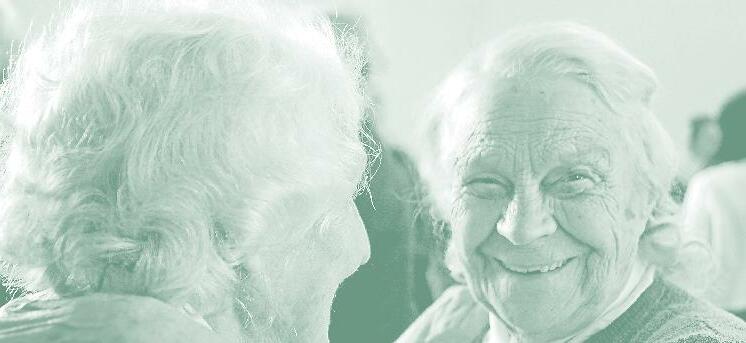
Further Reading Canadian Association of MAiD Assessors and Practitioners. 2020, Assessment for Capacity to Give Informed Consent for Medical Assistance in Dying: Review and Recommendations. Vancouver, CAMAP.
Council of Canadian Academies, 2018, Medical Assistance in Dying: The State of Knowledge on Medically Assistance in Dying for Mature Minors, Advance Requests, and Where a Mental Disorder is the Sole Underlying Medical Condition. Council of Canadian Academies. Ottawa.
Gordon, R.M., 2021. The Annotated British Columbia Incapacity Planning, Adult Guardianship, Medically Assisted Dying, and Related Legislation. Toronto, Thomson Reuters; especially Chapter 4.
A 2023 edition of the Gordon text will be available in the Spring 2023, once MAiD is available to adults who have mental disorders as their underlying medical condition.
It is also helpful to monitor the online journal “Policy Options” for the work of Professor Jocelyn Downie from the Health Law Institute at Dalhousie Law School, and especially the related end-of-life project (see, eol.law.dal.ca).
Practitioners should also be aware of the information about MAiD procedures in BC that is available on the provincial Ministry of Health website. s Dr. Robert Gordon is Professor Emeritus in the School of Criminology, Simon Fraser University.

•
•
•
•
•
•
•
•
•
•

I’m trained as a family doctor. I did 10 years cradle-to-grave medicine, general practice, and then focused exclusively on maternity and newborn care for another 12 years.
Ron Usher: You’ve seen the whole spectrum. Through the births of my own three children, I know how remarkable maternity practice is. My sister-in-law has just retired from a long career as a midwife.
In
Ron Usher: Dr. Green, thanks so much for joining me today. This interview is prompted by positive reviews of your new book, This is Assisted Dying: A Doctor’s Story of Empowering Patients at the End of the Life, published by Scribner. Congratulations.

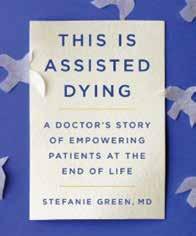
The Scrivener magazine is read by many legal professionals in BC and others. Let’s focus a bit on your career history.
Stefanie Green: That is a very privileged job. I love my years in maternity care.
Ron Usher: What you’re doing now is also a remarkably privileged position. Please tell us about it.
Stefanie Green: There’s a lot of paradox in the work I do right now. I feel my time in maternity really helped prepare me for end-of-life work. The skill set was remarkably transferable. I didn’t realize that when I began.
Doing maternity care, I walk into the room for the delivery as a knowledgeable expert to help guide the family through one of the most intense and important days of their lives . . . it’s very emotional, very intense . . . lots of family dynamic at play.
Ron UsherI’m not the most important person in the room. Something really impressive is going on. After the moment I place the baby onto the chest of the mum, I don’t stay to have champagne with the family. I gracefully withdraw.
What I just said about maternity care can be equally said about end-of-life and assisted dying. It is also one of the most emotional and important days . . . with lots of family dynamics. I’m there as a knowledgeable guide and a witness. There’s a time when I should respectfully withdraw from that grieving moment. Being invited into that very intimate space with families, whether it’s a birth or a death, is incredibly privileged work and very, very meaningful. To be able to facilitate someone’s final wish is a remarkable invitation.
Ron Usher: Our BC Notary members facilitate Personal Planning. They assist people to prepare Wills, Representation Agreements, Advance Directives, and Powers of Attorney—legal documents about the unknown future.
When you sit down with someone who’s completed a request form for assistance-in-dying, Dr. Green, that moves from theoretical
planning to very precise planning. I imagine that’s quite a different step psychologically for people.
Stefanie Green: Yes. I’ve never practised law or been a Notary, but I imagine some pretty vulnerable conversations take place in those offices. You talk to your clients about their wishes and the person they want to speak for them in future. You encourage people to go through that thought process; you’re certainly inspiring that kind of conversation internally with people and probably with their loved ones, too.
There’s definitely some overlap between your consultations with your Notary clients and my medical consultations.
When someone comes to ask me for assisted dying, they’re very much in the moment. For a person to qualify, a list of things needs to be true. One of them is the patient is suffering intolerably. Being a physician is a very special position. I am with someone who has come to me at their most vulnerable.
Society has given doctors an aura of authority and respectability and trustworthiness. People will tell us their deepest fears and greatest secrets and explain why they want to have an assisted death, what they’re trying to avoid, and what they’re experiencing. They are very much in the moment and in the thick of it.
Ron Usher: As the story goes, no one at their death says, “I wish I had spent more time at the office.”
That’s what I especially value about your book. You tell the stories accurately. People are having
conversations about topics we normally don’t talk about. You’ve noted in a couple of the interviews in your book how you found yourself needing to speak plainly and freely.
Stefanie Green: Yes, very much so and patients really appreciate that. They’ve often not had the opportunity to sit down with a health care practitioner who’s willing to be that frank with them.
North Americans are not very good about talking about death and dying in general. I’d like to facilitate change. I think some of that change has to come from the clinicians, as well.
Many specialists are not comfortable talking plainly about what to expect and what happens if the treatment doesn’t work and what the normal or natural dying process looks like and what the person can expect along the way. Sometimes people come to me to ask for an assisted death, but they’re not well informed about what palliative care can offer them and how a natural death can be supported. Part of my job is to explain that process fully so they can make a more-informed decision.
Some people are surprised; they say, well, that actually doesn’t sound quite so bad . . . I could do that. If I had that kind of support, then I wouldn’t need to call you, Doctor.
And that’s a win for me. When you don’t need to choose one or the other, you can go down whatever path. And if it’s not working for you, you can always call me to see what we can line up for you.
When someone comes to ask me for assisted dying, they’re very much in the moment. For a person to qualify, a list of things needs to be true.
Frank conversations are essential for informed consent and they’re also essential for people. Their families are very, very grateful for that frank and honest conversation.
Ron Usher: You bust through all the euphemisms and the dancing around and get to the point.
There’s a marvellous little paragraph in Moby Dick where Ishmael makes a Will after a particularly scary whaling experience. It’s a beautiful description of the relief he feels. He was directly confronted with the possibility of his own death. When he’s taken care of business, he just feels relief.
Certainly my own experience drafting large numbers of Wills is that people, even if they were hesitant, feel very grateful when the Will is done and for the plain talk and the chance to have confronted their wishes.

Stefanie Green: I see a transformation when I finally tell someone they’re eligible for the MAiD care. When someone has gone through that rigorous process with me and I’m in the position to finally tell them they are eligible, regardless of whether they’re going to go on or not, is really remarkable.
I see their shoulders drop, I see their head nod. I see a little smirk or a smile and immediately an expression of gratitude for the mere possibility.
Whether they go on to have an assisted death or not is almost moot at that point. I am convinced it is objectively therapeutic to empower someone to let them know they have that possibility. Just knowing they’ve got it reduces suffering in and of itself— sometimes sufficiently enough that they don’t even go on to ask for an assisted death. It’s really amazing.
Sometimes when you get a prescription for anti-anxiety meds, you might put it into the cupboard and never touch it, but you know it’s there. That is a relief already.
Ron Usher: It can be called the placebo effect, but it’s a real effect.
Stefanie Green: I’ve been quite struck by that in this work and it’s not let up in 6 years. I see it every time. The conversation with the client, of course, is always unique and personal.
Ron Usher: I found myself thinking of my own father’s passing 32 years ago. He had been suffering almost a decade from Waldenstrom macroglobulinemia, a rare disease.
He was in hospital and was being presented with all sorts of enthusiastic and invasive treatments when clearly by that point he was having total body organ failure. A most marvellous older male nurse who had seen it all was so kind to my father; he shielded him from all the well-meaning MDs who had just one more surgical intervention to try.
If MAiD had been around at that time, my father would have chosen it and not to die alone in the middle of the night in a hospital room. I had spent the entire previous night with him . . . it was a marvellous evening. I got to have a tiny taste of what it’s like for families to have a lovely, quiet, last time together.
Stefanie Green: Yes, to find that closure with each other is a real gift. That’s the only silver lining to someone’s end-of-life—to know when the date and time are coming, to be able to find that closure and say the things you really want to say to them . . . to have the opportunity to speak to the person you haven’t spoken to in 10 years—or purposely and consciously decide not to.
Either way, a real sense of closure can happen. It can be quite healing for families and for patients. It can be very, very powerful for them. I like to see them take advantage of that. But those conversations are personal. It’s almost impossible for me to do this work and not be affected personally. I may go home and think, well, why was that so striking to me? Who does that remind me of and what would I do in that situation? Who do I need to talk to about that? I need to share this with my husband. What do I need to say to that friend I haven’t spoken to in years? It’s impossible not to project into my client experiences and reflect on them.
Assisted death is less about dying and death than it is about how you wish to live. I’m absolutely convinced of that. That’s why people choose MAiD: They know what’s important to them in their living and in their life and how they want to live and what brings agency and meaning and joy to them.
When they’ve lost that, they’re ready to make that next step. It’s also about grabbing onto the time you have left. Once you know you’re going to have an assisted death, you live very intentionally for the last few days or weeks. It’s very much about living and how you wish to live and what’s important in our living as much or more than about dying and death. It’s really remarkable.
Ron Usher: I worry about how extraordinarily difficult the situation is for family and others. When I read your book, I learned it is often a remarkable experience for family. Clearly, it’s difficult; everyone would acknowledge MAiD is an extraordinarily rare and unusual event.
Stefanie Green: First, the patient is absolutely 100 per cent sure or we wouldn’t be going ahead.
They’re really quite comfortable and at peace with their decision. By the time I show up, they’re ready. Really ready. That day is not as difficult for the patient as it is for their family. There’s no doubt the family is putting the patient’s wishes and needs above their own that day. And 9 times out of 10, that family will rally around, support the patient, and feel a real mixture of emotions when the person dies because there’s a certain relief that they’re not suffering anymore.
There’s also guilt. Could I have done more? Could we have done something to make it better,
Because every relationship is special, when you lose someone you will mourn them in your own specific way. Some people need more support than others, whether it’s a natural death or it’s an assisted death, It’s not a perfect solution for everyone. I do think it does bring closure and a sense of relief and gratitude for the majority.
Ron Usher: Certainly it’s a field that attracts continuous controversy. I’m sure you’re familiar with the various people who have their concerns. It seems people are getting very concerned that MAiD somehow would not respect persons with disabilities or some economic circumstances. I’m sure you’ve dealt with those questions and they must be of some concern to you.
Stefanie Green: There has been a particularly negative news cycle of late that I think has been less than informative and less than forthcoming about all the details. I find that frustrating as a practitioner.
knowing that we really couldn’t have? But you can’t help but feel that way. There’s a sadness, a tremendous sadness for losing a loved one. You can’t get around that. And at the same time, there is tremendous gratitude for the way that it went.
To be fair, it’s not all “strawberries and champagne.” It’s a real rollercoaster for families. But I would say, by and large, they have been positive events.
There are some family members who struggle with their loss and with the complications of grief. Everyone lives uniquely and everybody grieves uniquely.
I would be the loudest to maintain there are significant challenges in society, significantly inadequate resources for community mental health, for community disability support services, and palliative care resources in many communities at every level . . . municipal, provincial, and national.
Nowhere in the rigorous criteria for assisted dying is lack of housing an eligibility criteria. Nor is living in poverty. Those real things happen in society, but they don’t make a person eligible for MAiD.
When I see a story in the news or an international headline saying Man lost home and decided to have assisted death in Canada, I have to push back. What makes you think he’ll qualify? Just because he’s lost his home doesn’t mean he can call me up and say, Well, I’ll have MAiD.
Everyone lives uniquely and everybody grieves uniquely. Because every relationship is special, when you lose someone you will mourn them in your own specific way.
It doesn’t work that way. Lack of housing, lack of basic income support, lack of good community resources all impact a personal sense of suffering. In and of itself, a disability does not qualify for an assisted death. There are six or eight other things that must be true.
There are many diverse views within the disability community. In fact, those who self-identify as
hypocritical and disingenuous of them to leverage the issue of reduced resources to promote an anti-MAiD goal.
We’ve got a universal health care system with resource limitations. We will always be arguing about where the resources should go. We would love to have an MRI machine in every single hospital in this country. We don’t.
physically disabled helped push these laws forward in this country, based on the fact that they felt they were being discriminated against because of their disability. They wanted access to this care. To not allow them access to care was deemed discriminatory, e.g., at Carter, Trujillo, and a number of other places.
Every case must be judged case-by-case and the entirety of the criteria must be met in every case.


Some stories have been incomplete in their reporting. I find that frustrating. But I challenge anyone from any community to stand next to me and blast the government for better resources. I can’t do my job if those resources aren’t available. How am I supposed to offer people reasonably available means to reduce their suffering if the resources don’t exist?
Many of those folks will not stand next to me and demand those resources because their true goal is to oppose MAiD, not to demand resources. I find it
We do what we can with the limited resources we have, and we push to do better in the areas we think take priority. And we’re constantly pushing to do better. In the meantime, I don’t think we should allow people to suffer intolerably because we haven’t done adequately in certain areas. We need to do both at the same time. We need to allow and push for both at the same time.
People don’t ask for assisted dying because of physical pain very often. That’s rarely the issue. Lots of international data would support that and Canadian data also shows that. Over 80 per cent of all people who’ve received medical assistance in dying in Canada had access to and received palliative care.

Generally speaking MAiD has proven itself to be profoundly meaningful work that we can be proud of being involved in because we’re careful and cautious and take our responsibility carefully.
I would add we’re quite grateful when BC Notaries and lawyers are willing to take part in the qualification process by doing the witnessing. The fact that legal professionals are stepping up and doing that work makes a tremendous difference to our patients. It eases a burden for them. Thank you for being openminded. s

We are proud to have sponsored the construction of the World Housing Women and Families Centre in Vancouver’s Downtown Eastside.
The Women and Families Centre will ensure that single women and women with children living on the streets without safe and secure housing will be given a place to transform their lives. Get the facts from us directly!
For over 60 years Chicago Title Insurance Company has proudly protected Canadian real estate assets from coast to coast.
For over 60 years Chicago Title Insurance Company has proudly protected Canadian real estate assets from coast to coast.


The Women and Families Centre will ensure that single women and women with children living on the streets without safe and secure housing will be given a place to transform their lives. Get the facts from us directly!


Christina Regional Manager
Christina Regional Manager
Greater Vancouver Area 604.355.6788 ccheung@ctt.com
Greater Vancouver Area 604.355.6788 ccheung@ctt.com


Darren Regional Manager British Columbia 236.330.4936 dglazier@ctt.com
Darren Regional Manager British Columbia 236.330.4936 dglazier@ctt.com
Scan the QR Code to learn more:
Scan the QR Code to learn more:

Disclaimer: This advertisement is intended to provide general information on Title Insurance. For specific details regarding policy coverage, conditions, exceptions and exclusions, please contact us for copies of the complete title insurance policy. Known title and survey defects are subject to underwriting review and approval.
Disclaimer: This advertisement is intended to provide general information on Title Insurance. For specific details regarding policy coverage, conditions, exceptions and exclusions, please contact us for copies of the complete title insurance policy. Known title and survey defects are subject to underwriting review and approval.
It was a beautiful sunny, warm late August afternoon in 2018 when my husband
Don died quietly and peacefully in our Ocean Park home.
After years of suffering with increasingly debilitating illnesses, he chose to end his life on his own terms.
Since that day I have been asked to share our knowledge and experiences with others to help them to navigate the emotional, medical, and legal shoals of endof-life events. I do so with gratitude to those who paved the way for medical assistance in dying (MAiD). It is not easy because every time I share those times, I go back and relive them.
Perhaps you are suffering from a life-threatening illness and do not wish to put yourself or your family through the ordeal of a long and painful death.
Perhaps your best friend has discussed MAiD and wants to work through her thoughts with you.
Perhaps you are related to a person who wishes medical
assistance in dying and you think it is far too soon to think about death.
Or perhaps you have been asked to witness the signature of a person making an application for MAiD. If any of those situations apply to you, I hope the following story helps make your life a bit easier.
decision in 2015 and confirmed by federal MAID legislation enacted in 2016 (Bill C-14) and amended in 2021 (Bill C-7).
The federal government publishes annual reports with MAiD statistics.
• Since 2016 over 31,000 Canadians, including 6100 British Columbians, have accessed MAiD.
• In 2021, MAiD deaths accounted for 3.3% of all deaths in Canada.
• 65% of those who sought MAiD were suffering from cancer, followed by cardiovascular illness at 18.7% and respiratory illness at 12.4%.
• The average age of MAiD recipients in 2021 was 76.3 years.
First some facts to set the stage. Medical assistance in dying is—99 per cent of the time in Canada—the injection, on request of a person, of a substance administered by a doctor or nurse practitioner that causes the person’s death. Taking medications orally is the other option. The right to MAiD was recognized by the Supreme Court of Canada (SCC) in the Carter
In the Spring of 2018 when my 81-year-old husband’s health was in rapid decline (suffering from cancer and cardiovascular and respiratory illnesses), he started to talk about the end of his life. I was in full “cheerleader” mode at that point, emphasizing how lucky we were to have the wonderful life we were living and to have access to the medical care he needed as he needed it.

After he retired to bed, I felt terrible. I realized I had been projecting all my fears on him and I hadn’t really been listening.
One day his increasingly urgent chats turned into an argument. After he retired to bed, I felt terrible. I realized I had been projecting all my fears on him and I hadn’t really been listening. I apologized—to his great relief—and started working with him to seek the result he wanted.
Don’s first attempt to get help was to ask his family doctor— always the best place to start if you have one. While his doctor was compassionate and supportive, he was unable to provide my husband with the advice he was seeking.
That response left us at a complete loss and feeling rudderless. We had both supported the notion of medically assisted death long before the SCC clarified the legal right and had also supported the advocacy work of Dying with Dignity Canada. We called the Ontario office of the society and reached a compassionate, thoughtful, and well-informed staff member. What a relief that was.
She answered all our questions, provided written and online documentation and information, and most important gave us the number of the MAiD coordinator of Fraser Health Authority (FHA), our local health authority.
The five regional health authorities in BC have assisteddying teams that help individuals navigate the MAiD process.
My husband obtained the information he needed to complete a “Request for Medical Assistance in Dying” form that he signed in front of two close friends as witnesses and submitted to the MAiD coordinator.
Since 2021, only one “independent” adult witness is required for a request for MAiD. The criteria for being “independent” can be found on the Request Form
1632, available on the BC Ministry of Health website.
Following completion of the MAiD Request form, two independent medical assessments must be conducted to ensure the applicant qualifies. In my husband’s case, the MAiD coordinator made arrangements for the assessments to be conducted in our home.
For those considering MAiD, the most worrisome and critical question is often whether they are even eligible to receive it. The two doctors conducting the independent medical assessments were required to determine whether my husband met the following MAiD criteria.
• Must be eligible for publicly funded health services in Canada.
• Must be at least 18 years of age and capable of making decisions with respect to his or her health.
• Must be suffering from an “irremediable medical condition,” that is, a serious illness, disease, or disability in an advanced state of decline that cannot be reversed— as determined by medical practitioners.
• Must be suffering “grievously,” that is, the unbearable physical or mental suffering from an illness, disease, disability, or state of decline that cannot be relieved under conditions that the person considers acceptable.
• Must be making a voluntary request without any external pressure.
• Must be giving an informed consent (that includes being informed about any means available to relieve suffering, including palliative care).
My husband asked at the end of each assessment, “Did I pass?”
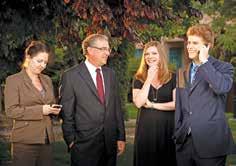
• Undergrad degree with a CGPA not less than 3.0
• Interest in the practice of law
• Strong entrepreneurial spirit
• Strong communication and people skills
• Dedication to community and serving the public
• High degree of honesty and integrity
For more information, please contact The Society of Notaries Public of BC 1-800-663-0343 or visit our website, www.snpbc.ca.
BC NOTARIES ARE RESPECTED IN THEIR COMMUNITIES.
There are business opportunities for Notaries in various communities throughout British Columbia.
His relief was audible when he received positive replies in each case. I was present at both assessments and the doctors made a point of asking me how I felt about the discussion. I told them I was not ready to have him leave and wished he would wait longer but then said I understood, however, that this was his personal journey—not mine.
I added that at the end of the day, not only was it his own decision, I saw my role as his wife to be supportive and helpful and not to add to the burden of his decision by expressing any reservations.
For some close relatives it may be difficult to accept the fact that they do not have a determining say or voice in the final decision. It may be helpful to reframe the issue as being similar to the decisions capable adults make every day when consenting or refusing to consent to medical treatment.
In the intervening weeks before the assigned date, I spoke to him several times about being able to change the date to a later time or changing his mind altogether. I asked him the same question on his last day.
On each of those occasions, he made it clear that he had made up his mind and that is what he wanted. When the doctors and nurse arrived at the appointed time, they asked him if he still wanted to proceed—and before administering the medication, they asked him again. I never had any misgivings or doubts about his intention but I was grateful he was given many clear opportunities to express doubts or to change his mind.
In 2021, 45 per cent of MAiD deaths occurred in private residences.
My husband, fully capable of making his own day-to-day treatment decisions, did not need my consent or agreement for those purposes nor would he need it then when requesting medical assistance in dying.
I have also been asked why my husband did not seek palliative care when it was offered. I cannot really answer that question. I just know he did not want it and that was his choice—even though it might have been my choice if it was my decision to make.
I have also been asked whether he considered changing his mind.
One of the critical factors of course is that a person requesting MAiD must be capable of and give consent to the procedure just before it is given. Don was very concerned about losing capacity before he was able to access MAiD.
That is a very real concern for many people; fortunately, a change was made to MAiD law in 2021 to allow a person who has been assessed and approved for MAiD to work with the doctor to set an advance date on which MAiD could be administered—even if in the intervening period the person lost capacity to give consent on that day.
That small but important change to the law, which was not in place when my husband applied for MAiD, could have given him the confidence and comfort to live longer knowing that MAiD would be
MAiD recipients have the option of deciding where they wish the procedure to occur.
administered on a scheduled later date even if he had lost capacity in the interim. I am very sorry that option was not available to him at that time.
MAiD recipients have the option of deciding where they wish the procedure to occur. In 2021, 45 per cent of MAiD deaths occurred in private residences.
After my husband was approved for the procedure, the doctor asked him whether he had any special wishes about the circumstances under which it would be conducted—where, with whom present, as a solemn religious occasion, in a celebratory framework, etc.
We found the open-ended question to be very respectful and indicated a flexible and compassionate accommodation to personal preferences.
My husband decided he wished to die at home with only me at his side. While I know of people who involved their family and friends in a special celebration of life, my husband wanted a very quiet and private time.
But the engagement of family is a very individual matter, often determined by cultural or religious considerations and by the state of family relationships. In our case my husband spoke to his children and step-children about his decision and why he had made it. Thankfully they were fully supportive, but even if they had not been, I encouraged and supported his decision to give them the opportunity to prepare for his death.
If a person requesting MAiD anticipates strong resistance from family, important end-oflife conversations may never take place—resulting in some cases of anger and disbelief at the surprising and unexpected event.
If I may offer one piece of unsolicited advice, keep the lines of communication open and encourage end-of-life discussions among family members long before a MAiD decision is under active consideration.
As for the MAiD procedure itself, preparations were carried out quietly and efficiently in our kitchen as the nurse set up an IV in my husband’s arm in our bedroom. After confirmation again of my husband’s wishes and consent, the doctor administered a series of medications . . . one to numb the veins, one to induce sleep, and the last to stop his heart.
The nearly 3 weeks between the time my husband was approved for MAiD and the afternoon he died were the longest and shortest I have ever experienced.
Although more frail, Don was not bedridden and continued to be a “take charge” kind of guy right to the end. Remarkably, a week before he died, he insisted I arrange a garage sale to clean out his stuff in the garage before he was gone.
I watched with growing despair as he purged our home of his personal belongings until the night before his death, when I was confronted with only one freshly pressed shirt and pair of pants hanging on his side of the closet. He shared with me his last intimate exchanges with our children and their last words to him. We had spoken often and openly about what it would be like “after.”
He left this world with grace, dignity, and courage. I miss him.
Postscript: With some considerable trepidation, I embarked on this very public narrative of a very private moment in our marriage.
Focusing on Don’s face I remember how easily he just went to sleep with a slight snore and very shortly after, he was gone.
As I write this, I feel my heart clutching with the recall of it. Our much-loved poodle came round to my side, pushed her head under my elbow, and rested her chin on his arm. She knew he was gone. She kept vigil at the foot of the bed until the funeral-home people arrived, to quietly and with great tenderness, remove him from her care.
Don had been an ardent supporter of medical assistance in dying long before the SCC decision. I decided after careful thought that he would have wanted me to share this story if it would help others in similar circumstances.
I know he would also want me to continue to advocate for changes in the law that would permit people the option of giving an advance request for MAiD. And so, in his memory, I shall. s
Bonita (Findlay) Thompson KC is a senior counsel with the law firm Singleton Reynolds in Vancouver. Since her husband’s death, she has volunteered with Dying with Dignity Canada.
If a person requesting MAiD anticipates strong resistance from family, important end-of-life conversations may never take place— resulting in some cases of anger and disbelief at the surprising and unexpected event.
Grand Okanagan


Kelowna!

















Born in Hoy Ping, China, in the early ‘40s, Peter has two siblings Rosanna and David.
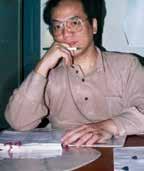
He met his future wife Rebecca in Hong Kong at a Korean restaurant where he was a waiter and she was a cashier. Peter and Rebecca have been married 49 years.

While attending school in China, Peter dreamed of being a teacher—particularly in the subject of English. He enjoys reading and writing . . . a true scrivener.
In the early ‘70s Peter took a trip to Canada to seek new pastures and was introduced to possible work in a Vancouver Chinese Restaurant in Chinatown. The head chef handled the interview like this: “Make me a dish, Chinese Broccoli and Beef. If you can make it well, you’re hired.” Peter worked in the restaurant for many years.
He met lawyer Harry Fan at the restaurant. Harry was a graduate of the UBC Law School Program, Class of 1958.
Peter eventually went to work for Harry at Fan & Company as a property manager and conveyancer. In 1990, Harry suggested that Peter apply for the BC Notary program . . . and the rest is history.
Peter has two children, Josephine and Steve. Josephine was an elementary school teacher early in her career and eventually began work as a project manager for highand low-rise strata developments in the Lower Mainland and the Fraser Valley. She has worked for multiple developers in BC and continues to lead projects as they are being developed.
Steve is a Notary Public currently practising in Burnaby and serving his second term as Second Vice President of The Society of Notaries Public of BC.
Peter loves people. Helping people was the goal of his
successful 30-year career as a BC Notary Public. From 1992 to 2022, Peter served his community, family, and friends as a dedicated and compassionate Notary. Once he became a Notary, he stopped cooking all together—there was no time!
Today in retirement he enjoys coffee with his friends, watching Canuck games, and long sessions of Mah Jong. For exercise, he plays ping pong.
The most important things to Peter are family and health. He nurtures those values above all else. s
I served as a White Rock City Councillor from 2014 to 2018 and was so proud of what our Council accomplished during our term. When a new council was elected, their term was exceedingly difficult on our community. A lack of leadership at the Council table led to tremendous staff turnover. A sitting City Councillor sued our taxpayers.
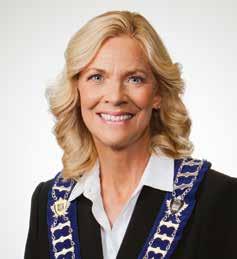
I put my name forward hoping I could beat the incumbent Mayor, to try to right the ship.
What support assisted your success?
I had an excellent group of volunteers on my campaign. Together we knocked on almost every door in White Rock. We stood on the street corners waving my

signs early in the morning when commuters were catching their buses. I attended many functions and listened to the concerns of the residents. My platform turned out to be what most people were saying needed to be fixed in the city.
• Restore decorum at City Hall. Rebuild relationships within and between Council and staff.

• Balance fiscal responsibility with key priorities, while keeping taxes in check.
• Review and guarantee permit timelines and restore confidence that White Rock is open for business.
• Get shovels in the ground on an affordable housing project.
I’ve served on Pitt Meadows City Council since 2018. I was proud of the work that been accomplished and wanted to continue to build positively on this. Over the previous term, I was part of a council that brought stability and respect back to City Hall and Council. I had the opportunity to work with a great team, City staff, and community to enhance public safety with improvements to Fire & Rescue Services, approval of an autonomous police detachment, major infrastructure, affordable housing, and completion of the OCP and Parks, Recreation, and Culture Masterplan.
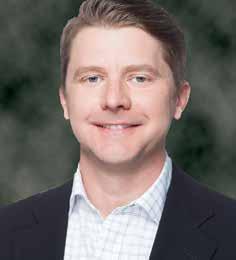
My success is absolutely supported by the people in my life. I live and serve in a wonderful and
engaged community; my friends and neigbours have supported me and my family along this journey.
My strong and supportive Notary Partner Lucy Meechan is thriving in the operations of our practice. As well, my predecessor Mayor Bill Dingwall and my previous Council colleagues have provided me with mentorship and guidance as I have grown in my civic leadership

position. Most important has been the support, love, and patience of my husband Garett and daughters Aden and Gracie.
I am proud of the work done and believe I can assist with enhancing our great community as we move forward. My goal is to take action and implement many of the priorities that have been identified, in particular recreation, agriculture, dyke and flooding, and public safety improvements. Integral to the long-term health and prosperity of Pitt Meadows is the ability to work together with residents, businessowners, regional partners, other orders of government, First Nation rights holders, and more. Positive and respectful working relationships matter.
For the year leading up to Election 2022, I had been watching the local government scene with
interest, and dismay. I could see the reputation of the city reverting back to the ridicule I remembered as a child. I was motivated to change the dial and contribute to the integrity and transparency that I considered lacking.
Being part of a team assisted in my success, particularly in a city approaching nearly 600,000 population. It certainly proved helpful in door-knocking and in shared fundraising! I also think the volunteer work I have done within various sporting associations was an advantage.
• Establish an open and welcoming environment at City Hall.
• Find a way to coalesce senior government and community partners in building more affordable housing, reducing red tape, and re-establishing the RCMP as the city’s policing agency.
• Ensure my Notary business remains strong and separate from my responsibilities to the community. Job One is serving the community.
NICOLE MACDONALD Mayor, Pitt MeadowsIn 2018 I was elected a School Board Trustee, a position I enjoyed very much. This time around, I decided to run for City Council to continue the success I had on the School Board. It felt like a natural transition, so I accepted.
I ran with a team of highly capable people—our slate is “Achieving for Delta.” Our team was composed of a candidate for Mayor, 6 candidates for City Council, and 7 candidates for School Board Trustee. Working together as a
large group made us stronger and ultimately successful—we were all able to rely on each other to assist with the campaign. We also shared a campaign manager and assistants.
I want to help
• keep Delta one of the safest and best places to live, work, and play in Canada;
• address the housing shortage;
• take action on climate change; and
• protect our farmlands.
I was largely motivated to see the guidelines for development from within the Town’s new Official Community Plan carried over to the updated Zoning Bylaw, a process that will be conducted over the next year.
With the support of the British Columbia Notaries Association Board of Directors, I was pleased to run for re-election to Sidney Council.
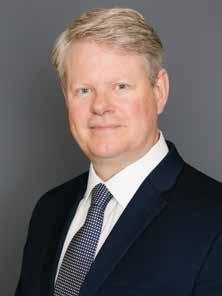
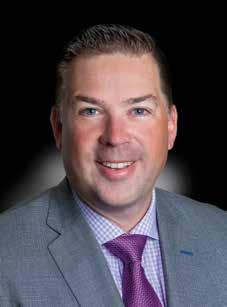
It was easier to run for election a second time. Although campaigning is challenging, you know what to expect and can plan for the commitment that is required.
As the Council Liaison to the Advisory Planning Commission, I look forward to taking steps to increase housing inventory, in particularly rental-housing stock in Sidney. I will also look to advance important municipal infrastructure projects that must be built to face the challenges of climate change, while aiming to retain the character of this seaside community.
What advice do you have for BC Notaries running for Local Government positions in the future?
BC Notaries are proudly connected to their communities and are often well suited to participate in local governance.
My appreciation goes out to any BC Notary who steps forward to serve in political life. Unique pressures come with local governance. You aren’t whisked away to the anonymity of Victoria or Ottawa. You are in your community each and every day—a trip to the grocery store is a public consultation opportunity!
One piece of advice . . . please don’t pay much attention to social media. It’s all too easy for a vocal minority to lash out from behind a keyboard. Of course, that advice doesn’t apply only to those in political life! s
CHAD RINTOUL Councillor, Sidney

The reception for newly commissioned BC Notaries was held October 22, 2022, at the SFU Wosk Centre in downtown Vancouver.




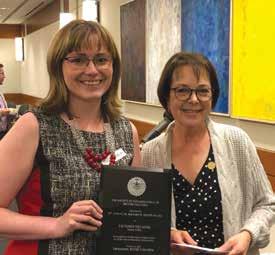
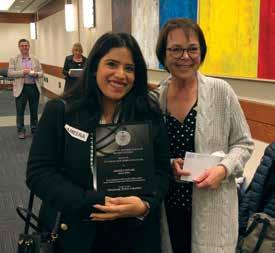
 Victoria Helmink and Marny Morin, Secretary of The Society
Ameera Shums and Marny Morin
Victoria Helmink and Marny Morin, Secretary of The Society
Ameera Shums and Marny Morin
Heat oven to 350°.
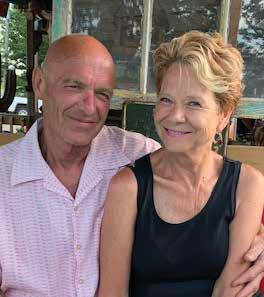
Cook for 30 minutes with lid on.
Lower heat to 250° and continue to cook for 4 hours with lid on.
After the 3rd hour, check the pan.
If the consistency of the liquid is still soupy, remove the lid and continue to cook. The desired consistency is gravy-like.
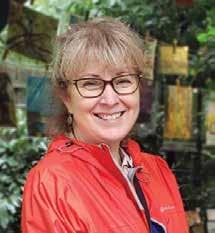







The Notary Foundation of British Columbia works with interest generated by BC Notaries’ Trust Accounts and received from our financial industry and other partners, to promote education for BC Notaries and the public, foster legal research, support law libraries, and help fund legal aid in BC.
Talk to us if you’re interested in having an impact on those important facets of BC’s communities.

Funding and strategic decisions and oversight are provided by a Board of Governors made up of 8 Directors of The Society of Notaries Public, 1 appointee from the Office of the Attorney General of BC, and 2 Governors at Large appointed by the BC Government.
Applications for funding of law-related education programs, research, and projects may be made and will be considered throughout the year. For more information, visit our website at www.notaryfoundation.ca.

MAiD’s 4 sections address eligibility, safeguards, protocols, and noncompliance penalties.
The Charter
Prior to its passage, Canada’s Justice Minister Lametti examined (2020) Bill C-7 for inconsistencies in the Charter of Rights and Freedoms.
With section 7 protecting a person’s right to “Life, liberty, and security,” Minister Lametti did not consider MAiD “grossly disproportionate.”
Regarding section 15’s right to “equality,” Minister Lametti held that MAiD incorporated equality and was nondiscriminatory.
Minister Lametti held that Bill C-7’s private information reporting was compliant with the Charter’s section 8 protection against “Unreasonable search or seizure.”
The Charter’s section 33 Notwithstanding clause provided exemptions to Parliament and the Legislatures.
The Strata Property Act Strata Property Act (SPA) Section 121(1)(a) states, “A bylaw is not enforceable to the extent that it contravenes this Act…or any other enactment or law.”
Subject to Notwithstanding challenges, any MAiD-related strata bylaw is likely unenforceable because such “contravenes…any other enactment or law.” s As an Insurance Analyst, Ian Callaway has written extensively on Personal Insurance and Strata issues.
SHF Legacy Donor
Make a gift in your Will today: SurreyHospitalsFoundation.com/legacy-story


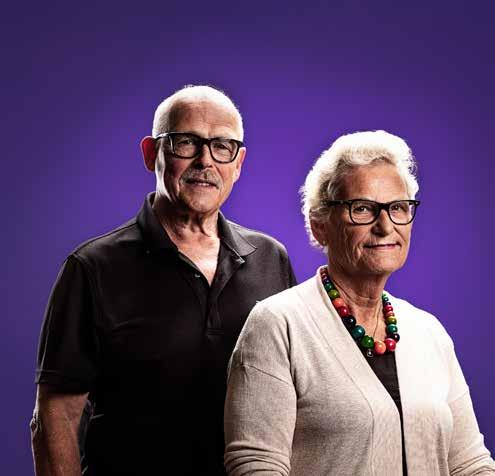
“I know these gifts will make life better for others dealing with difficult medical issues.” - Jan,
















Over 150 people were present. To enable us to take photos, the event began with a step-andrepeat . . . individual professional photos in front of an attractive background scene.
Appetizers were served in the lobby in a networking atmosphere so we had the opportunity to see and visit with others.
When the doors opened, we were welcomed by the glitter of diamonds and classic celebration decor.




There were voice recordings from Ian Macnaughton (our President, 1968 to 1969) and Graham Allen (President, 1978 to 1982). Both gentlemen extended




warm wishes and talked about changes and what the Institute was like in their days.
Following a fabulous dinner, the exciting program began. RIs were nominated for four awards. We call them Medals of Excellence.
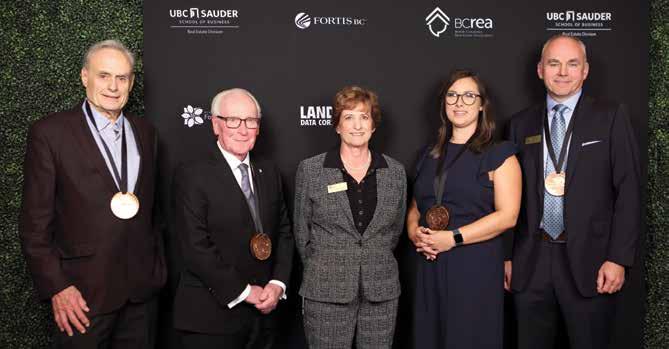
• Emerging Leadership • Ingenuity • Leadership • Medal of Distinction
Created by indigenous artist Roxane McCallum, the distinctive medals are copper on one side and cedar on the other. The copper side features the animal or symbol for each award; the cedar side displays the Institute’s logo, the name of the medal and year, and the proud recipient’s name.
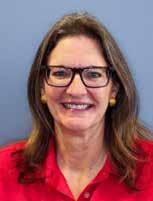
On October 26, 2022, REIBC held its inaugural Awards Gala in conjunction with its Diamond Anniversary (60 Years).
In between some of the award presentations, we heard from Past Presidents Andrea Fletcher and Daniel John. Their inspiring words included the difference the Institute made in their career, the changes they have seen in the market, and what they envision for REIBC moving forward.
With a lot of time for networking and visiting with friends, old and new, it was a great evening!
We would like to thank those who attended and congratulate the nominees and those who received awards. This event brought the best-of-the-best together. s




Brenda Southam is the EO of REIBC.


While a review of the law relating to safety deposit boxes (SDB) shows that about 90 per cent of the case law relates to the police search warrants or spouses alleging hidden assets, two important issues relating to estate litigation occasionally arise.

1) The issue of who is legally entitled to the contents of a joint safety deposit box: The surviving joint owner, or the estate of the deceased; and 2) does delivery of the safety deposit box key to a person in contemplation of death by the donor (donatio mortis causa ) sufficiently legally transfer the contents of the SDB to the donee.
When I was recently an executor, while listing the contents of the safety deposit box I was told by the banker that since it was a jointly owned box, the contents could be distributed only to both the executor and the joint survivor in the presence of each other.
I tried to explain to the banker that that was not my understanding of the law.
Clarke v. Hambly 2002 BCSC 1074 followed MacInnis Estate v. MacDonald (1994) that considered the issue of whether money deposited in joint accounts by a father in favour of himself and his daughter was an absolute gift to the daughter or held under a resulting trust for the benefit of the father’s estate.

The Court in Clarke v. Hambly concluded that the jointly held assets in the contents of the safety deposit box vested in the estate as a resulting trust.
MacInnis Estate v. MacDonald summarized the principles of law as follows.
a) The general rule with regard to joint bank accounts is that on the death of one customer, the survivor is not entitled, as against the estate of the deceased customer, to hold the funds as her own property, if the funds were provided entirely by the deceased customer, unless there is a presumption of gift or an
b) intention, on the part of the deceased customer, that the survivor shall have the right to retain the funds as her own: Re. Fenton Estate (1977), 26 N.S.R. (2d) 662 at 673.
1. The question, in the absence of fraud or undue influence, is the intention of the donor creating the joint account. The “ordinary rule” is that where the funds are provided entirely by the deceased, the funds revert to the donor upon a resulting trust: Edwards v. Bradley, [1957] S.C.R. 599.
2. The “ordinary rule” may be modified when the transfer involves a parent and child, in which case the presumption of advancement may arise: Shephard v. Cartwright, [1955] A.C. 431 at 445.
3. The presumption of advancement may be rebutted, but should not give way to slight circumstances: Shephard v. Cartwright.
4. Because advancement is a question of intention, facts antecedent or contemporaneous with the transaction may be put in evidence to rebut the presumption or to support it.
W.J. Mowbray, B.A., Lewin on Trusts, 16th ed. (London: Sweet & Maxwell, 1964) at 135.
5. The subsequent acts and declarations of the parties cannot be used to support their positions but may be used against them: Shephard v. Cartwright.
The leading case in British Columbia is Mawdsley v. Meshen 2010
BCSC 1099 where the Court found the defendant failed to rebut the presumption of a resulting trust on the balance of probabilities relative to the contents of the SDB and held they belonged to the estate.
Mawdsley followed the leading authority on presumptions relating to jointly held assets in Pecore v. Pecore 2007 SCC 17.
Generally speaking, where an individual gratuitously transfers assets into joint names with another or into another’s name alone, it is presumed that the recipient, who is given no value for the asset, holds the property in trust for the transferor. In such a scenario, the property is said to result or go back to the transferor, hence the term resulting trust.
The presumption of resulting trust finds its roots in the principle that equity assumes that parties make bargains rather than gifts. Thus if all of the contents of a safety deposit box were deposited by one of the joint owners, a presumption of resulting trust will arise that is rebuttable by sufficient evidence of an intention to gift, based on the balance of probabilities.
Case authorities relating to delivery of the SDB key in contemplation of death, involves the law of donatio mortis causa, which requires three elements:
1) The gift must have been made in contemplation, though not necessarily an expectation of death;
2) there must have been delivery to the donee of the subject matter of the gift;
3) the gift must be made under such circumstances, a show that the thing is to convert to the donor in case he should recover.
Donatio mortis causa may be defined as a gift made by a person in his or her lifetime with the intention that it should take effect only on his or her death. The gift is therefore conditional upon death, but once the condition is satisfied it takes effect retrospectively from the date the gift was made.
The leading case in British Columbia is Costiniuk v. Official Administrator of British Columbia 2002 BCCA 125.
In Costiniuk the deceased had no family, but had a close relationship with the plaintiff and had given her a key to her home many years before so she could check on her.
The deceased also gave the plaintiff the keys to her safety deposit boxes 1 month before her death, and during her final illness told the plaintiff from her hospital bedside that she wanted her to have everything. The deceased died before she could execute a Will that named the plaintiff her sole beneficiary.
Brown v. Rotenburg (1946) O.R. 363 (ONT C.A.) held that delivery of a key for an SDB box constituted a valid and effectual gift in contemplation of the contents of the safety deposit box.
The donor had parted with the only means that he possessed of getting at the contents, and thus control over the contents, therefore the donee was in a position to demand that the donor’s personal representative complete the title by furnishing whatever authority was necessary to take possession of the contents of the box.
In Bayoff Estate (2000) 3 WWR 455, the deceased gave the donee the key to a safety deposit box, and told her everything in it was hers. He, however, failed to sign the necessary bank papers to permit the donee to access the box.
That imperfect inter vivos gift was perfected when the donee became the deceased’s executrix and she was able to take delivery of the contents of the box.
The trial judge held, and the Court of Appeal upheld, that the plaintiff was entitled to the contents of the safety deposit boxes as a result of donatio mortis causa because there had been delivery of the keys by the deceased to the donee in contemplation of death.
It is probably safe to say that many people are using a safety deposit box to hold valuables for fear of home robberies or break-ins. That stored wealth is often considerable.
The executor has authority under section 183 WESA to open the SDB, and in the presence of a person in control of the premises, list an inventory of the box and then take the original Will with him or her.
If the contents of the box are valuable, they then must be listed as assets of the estate, and remain such subject to a successful challenge of a joint owner of the box or someone with a key asserting ownership by reason of donatio mortis causa. s
Trevor Todd restricts his practice to estate litigation. He has practised law in Vancouver for 48 years.
The passing of an owner of a strata lot in British Columbia can result in delays in the payment of strata fees, special levies, and other monies owing to a strata corporation.

This article contains a basic discussion about collecting strata fees and special levies when an owner dies. Some of the implications of the Wills, Estates and Succession Act (“WESA”) and the Limitation Act will be examined. Who to Contact
It is helpful to ask each owner to provide emergency contact information. The strata corporation’s privacy policy should allow council members and the strata manager to use that contact information when there is an emergency involving person or property and also with respect to determining the appropriate contact person upon the death of the owner. The emergency contact person may be able to tell council who will be handling the estate or provide council with further contact information for the next of kin.
If there is no emergency contact information provided and no other way of easily locating the deceased owner’s next of kin, it is possible
to search the Court registry online to see if anyone has applied for probate of the estate. Also, for Wills registered in BC, a Wills Notice Search will show the last known location of the Will. Another option is to contact the Public Guardian and Trustee of British Columbia to see if they are able to provide information.

An “administrator with Will annexed” is an individual appointed by the Court when the deceased dies with a Will but the Will does not appoint an executor.
Both an executor and an administrator are often referred to as a “personal representative.” That will be the term used in the balance of this article. Such personal representatives apply to Court for what is described as a “representation grant” under WESA.
Consider Who is on Title
When a person dies “intestate,” it means the person died without a Will.
An “executor” is the personal representative of the deceased who is appointed under a Will. When a person dies “testate,” it means the person who died had a valid Will.
An “administrator” is an individual appointed by the Court to be the personal representative when the deceased dies without a Will. When a person dies “intestate,” it means the person died without a Will.
The number of owners of a strata lot and the manner in which ownership is registered on title at the Land Title Office impact whether strata fees and any special levies will be paid after an owner dies.
When title to a strata lot is held by two or more owners as joint tenants, the surviving joint tenant(s) automatically assume(s) ownership of the deceased’s interest as if the transfer took place 1 second prior to the death of the deceased. A property owned in that manner does not trigger the requirement for probate. The surviving owner(s) remain on title and the interest of the deceased is transferred to the survivor(s) upon the filing of the appropriate form, together with a copy of the death certificate at the Land Title Office. That is a simple and relatively inexpensive process.
It can be an effective tool for estate planning purposes.
A joint tenancy is commonly, but not always, used when spouses own property together. There may be little disruption in the payment of strata fees, special levies, and other charges owing to the strata corporation upon the death of one of the joint tenants. The remaining owner continues to be responsible in the ordinary course for the payment of common expenses.
When title is held as tenants in common, the property of a deceased tenant in common results in that owner’s interest in the strata lot eventually being distributed in accordance with the terms of his or her Will or in accordance with the rules for distribution when an owner dies intestate.
It is also likely in that situation that the payments owing to the strata corporation will not be delayed, because there is at least one owner on title who is living.
When the sole owner dies, the title of the strata lot will first be transmitted to the personal representative and later transferred to one or more beneficiaries. That process takes time and could result in payments to the strata corporation being delayed. The collection process needs to be managed by or on behalf of the strata corporation to ensure that the right to collect money does not become “statute barred” as a result of the passage of time.
Payments to the strata corporation may be delayed until a representation grant is issued and the strata lot is sold. The strata corporation will then be paid upon the sale of the strata lot. Alternatively, the payment of strata fees may be delayed until a representation grant is issued and
the strata lot is transmitted to one or more beneficiaries.
The distribution of estate assets often takes over a year. Section 155 of WESA provides that estate assets should generally not be distributed for 210 days following issuance of the representation grant. Under section 69(1) of WESA, title to a strata lot will not generally be transferred to a beneficiary under the Will until the 210-day period expires. In addition, payment to the strata corporation may be further delayed if a close relative of the deceased challenges a distribution under the Will in Court.
The personal representative has an obligation to not pay out any claims by potential creditors that are statute barred, including claims extinguished because the limitation period has expired.
How to Extend the Time for Collection
Time limits for collections can be extended under the Limitation Act by way of an acknowledgement or by way of a payment. A personal representative acknowledging the debt in writing and signing the acknowledgement may extend the limitation period.
It may be helpful to ask the personal representative
• whether they are willing to acknowledge the debt in writing, and
The limitation period may also be extended when a payment is made. The clock for the limitation period resets from the date of the acknowledgment or the date of the payment, as the case may be.
• when they intend to pay the debt. Steps should be taken to ensure that the limitation period does not expire prior to payment. Be sure the acknowledgement meets the requirements of section 24 of the Limitation Act.
The limitation period may also be extended when a payment is made. The clock for the limitation period resets from the date of the acknowledgment or the date of the payment, as the case may be.
The Limitation Act provides a basic limitation period of 2 years. For instance, strata fees that became due and owing on or after June 1, 2013, are subject to a 2-year limitation period after the claim is “discovered,” which in the case of strata fees would likely be the date they become due.
Commencing an action in Court, filing a complaint with the Civil Resolution Tribunal, or commencing an arbitration are activities that preserve a limitation period.
If a strata corporation is faced with a collection situation involving an estate, it is recommended that the strata council seeks legal advice to ensure it acts appropriately and respectfully regarding the estate and that the rights of the strata corporation are preserved.
This article by Elaine McCormack, updated in 2022, was first published in Fall of 2015 in the CHOA News s
Elaine McCormack is a lawyer, mediator, and arbitrator with Wilson McCormack Law Group.
• Convenient online course format • Broad range of valuation and real estate business topics • Guaranteed Appraisal Institute of Canada’s Continuing Professional Development credits

Business Development Series: Eight courses designed to provide practitioners with the entrepreneurial and practical skills to establish and successfully operate a real estate business. Entrepreneurship and Small Business Development Business Strategy: Managing a Profitable Real Estate Business Succession Planning for Real Estate Professionals Organizing and Financing a Real Estate Business Accounting and Taxation Considerations for a Real Estate Business Marketing and Technology Considerations for a Real Estate Business Human Resources Management Considerations in Real Estate Law and Ethical Considerations in Real Estate Business
To find out more, visit: realestate.ubc.ca/CPD tel: 604.822.2227 / 1.877.775.7733 email: cpd@realestate.sauder.ubc.ca
I would like to extend my sincere appreciation to the Members of the BC Notaries Association for sharing the electronic version of The Scrivener magazine.
I am impressed at the practical information contained in each issue.
From legal matters, to consumer, to public policy, to Seniors issues, The Scrivener covers timely topics in a meaningful way.
I know many of my Constituents would benefit from the recent “SENIORS, Don’t be so Polite” story (page 40), as well as “DecisionMaking in Strata Corporations in BC.”



The Scrivener magazine is such a great read and resource for British Columbians.
I thank you.
Spencer Chandra Herbert , MLA Coal Harbour & The West EndOne of the magazines I eagerly look forward to reading is The Scrivener. Page after page and article after article contain noteworthy, interesting, and pertinent information that can be applied to our daily lives. The Fall 2022 theme of “Money Laundering/

Fraud” was a welcome reminder that we should be and remain self-aware about fraudsters and their devious ways to deceive us and to question all unfamiliar requests and activities.
In addition to the many significantly relevant articles that provided valuable lessons and guidelines to enhance our protection and security, the article “Pirates and Their Safe Havens” (page 42) gave a fascinating account of historic and intriguing past lives. As a child I often played the imaginary role of a cowboy or a pirate: Wooden peglegs, black eye patches, red bandanas, black flags with the white skull and crossbones. The names Blackbeard and Captain Kidd are among my vivid recollections.
The article revealed the financial support and encouragement given to pirates by merchants and monarchs of competing countries, Letters of Marque and Reprisal, and that daring female pirates could be as ruthless as their male counterparts.
As an adult, my interest in pirates was rekindled during a trip to the Caribbean Islands where pirates had established their safe havens and a visit to “Pirates of the Caribbean” in Disneyland.
I look forward to reading future editions.
Two thumbs up for The Scrivener!
Chuck CarterAs a child I loved playing Monopoly— with its stacks of brightly coloured bills and tiny green houses and red hotels you could “build” while on your way to amassing wealth.


The rent from a couple of strategically placed hotels on the highly coveted Boardwalk and Park Place could mean game-over for an unwitting guest. But with a lucky roll of the dice, you could avoid demise by taking safe haven on an innocuous space nestled between the two: “Luxury Tax.” In those formative years, I wondered what Luxury Tax meant.
As of September 1, 2022, the term “luxury tax” has taken on a whole new meaning for Canadians: The Federal Government surreptitiously introduced a new luxury tax in the 2022 Federal Budget. Known properly as the Select Luxury Items Tax, it is an additional tax on the sale or importation of certain vehicles and aircraft priced above $100,000, and certain boats priced over $250,000.
Generally speaking, applicability of the luxury tax is the same for aircraft, boats, and vehicles. It’s fair to say, however, that it will be disproportionately applied to vehicles, so that is where I will focus my discussion in this article.

• has a gross vehicle weight rating of 3,856 kg or less;
• was manufactured after 2018; and
• is designed to travel with four or more wheels in contact with the ground.
Generally speaking, applicability of the luxury tax is the same for aircraft, boats, and vehicles.
The luxury tax applies to subject vehicles purchased in or imported to Canada, as well as leases and some improvements made to subject vehicles.
In most cases, the luxury tax will not apply to subject vehicles that have been previously registered with the Government of Canada or a province (for the purposes of permitting that subject vehicle to travel on public roads).
Subject to limited exceptions, the luxury tax is applicable to any vehicle priced above $100,000 that meets the definition of a “subject vehicle,” be it a sedan, coupe, hatchback, convertible, SUV, or pick-up truck.
A subject vehicle is defined as any motor vehicle that
• is designed or adapted primarily to carry individuals on highways and streets;
• has seating capacity for not more than 10 individuals;
In other words, unlike the BC Provincial Sales Tax (12 per cent on used vehicles), the luxury tax does not apply to used vehicles purchased within Canada. It does, however, apply to imported used subject vehicles that have not been previously registered in Canada.
The luxury tax also applies to agreements to lease or licence use of a subject vehicle (or any other such similar arrangement) valued above the price threshold, if that subject vehicle has not been previously registered with the Government of Canada or a province.
Said differently, the luxury tax applies to new (and some used) subject vehicles if the risks and rewards of ownership are transferred by any form of agreement from a registered vendor of subject vehicles to a consumer.
Improvements made to subject vehicles within 1 year of the sale date, and that exceed $5,000, can also trigger the luxury tax. The cost to acquire and install items such as stereo systems, body kits, engine upgrades, vehicle wrap, and window tint would be considered improvements.
The costs of cleaning, repairs and maintenance, and modifications for the purposes of child safety or to enhance accessibility for persons with disabilities would generally not be considered improvements for the purposes of the luxury tax.
As with all consumption taxes, the vendor must collect the tax on behalf of the Minister of National Revenue and remit it to the CRA. Simply put, in most cases the onus will be on dealerships to collect and remit the tax.
Calculating the Luxury Tax Generally, the luxury tax is calculated as the lesser of
• 10% of the taxable amount of the subject vehicle, and
• 20% of the amount above the price threshold.
Determining the taxable amount of a subject vehicle for calculating the luxury tax payable depends on the circumstances.
The taxable amount is generally calculated as the sum of
• the value of the consideration for the sale of the subject vehicle; and
• the value of the consideration for any improvements made by
the vendor to the subject vehicle in connection with the sale that are not included in the above.
Note: For that purpose, the consideration includes cash and any in-kind consideration, such as trade-ins.
For imported subject vehicles, the taxable amount is calculated as the sum of
• the value of the subject vehicle as determined under the Customs Act, and
• the total amount of any duties and taxes (other than the GST/ HST) that is payable on the subject vehicle under the Customs Tariff, the Excise Tax Act, the Special Import Measures Act, and any other law relating to customs.
For leased vehicles, the taxable amount is the greater of
• the retail value—fair market value, plus shipping, taxes, levies, and all other fees of the subject vehicle at the time possession of the subject vehicle is first transferred to the lessee under the lease (or other such similar arrangement); and
• the retail value of the subject vehicle at the time the lessee first has the right to use the subject vehicle under the agreement.
Let’s say a subject vehicle is sold to a consumer who pays $100,000 cash and provides a trade-in valued at $50,000. In that scenario the total consideration is $150,000, which is also the taxable amount. The luxury tax would be calculated as the lesser of
• $15,000 ($150,000 x 10%)
• $10,000 (($150,000 − $100,000) x 20%)
Therefore, the luxury tax payable is $10,000.
Now let’s say the vendor of that same subject vehicle leases it to a consumer on December 1, 2022.
Under the terms of the lease, the consumer has the right to use the subject vehicle starting at that time; possession of the subject vehicle, however, is not transferred to the lessee until January 2, 2023.
On December 1, 2022, the fair market value is $147,000, plus a freight fee of $2,000 and $1,000 in federal excise tax payable, making the retail value of the vehicle the same $150,000.
By January 2, 2023, however, the retail value of the subject vehicle has decreased to $130,000.
The taxable amount of the subject vehicle is based on the retail value at December 1, that being the greater of the two amounts. The luxury tax then is calculated in the same manner as the first scenario, that is the lesser of the following.


• $15,000 ($150,000 x 10%)
• $10,000 (($150,000 − $100,000) × 20%)
Therefore, the luxury tax payable is $10,000.
That is a simplified discussion and illustration of the applicability of the Select Luxury Items Tax as relates primarily to passenger vehicles. I have omitted many exceptions and specifics. Readers are encouraged to refer to the Select Luxury Items Tax Act (S.C. 2022, c. 10, section 135) for greater detail and clarity. s Jeremy Andersen is a Sooke Notary Public and CPA, CA with 20 years’ experience
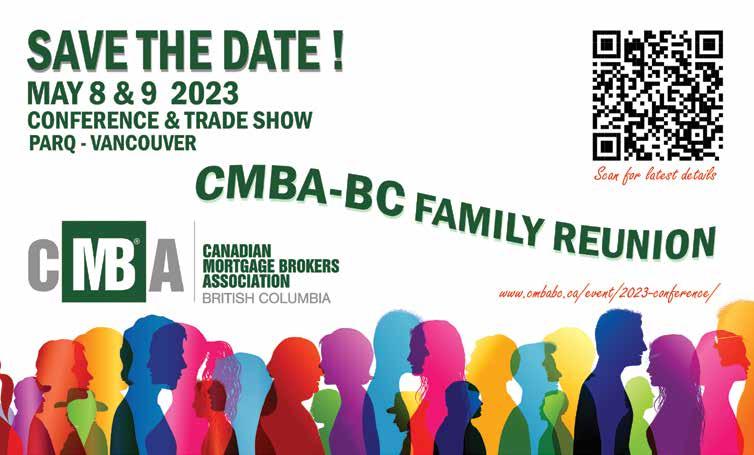


Until recently in our Notary office, we had a b/w printer at every desk.
Now we are centralized to one high-quality colour laser printer. Not only is that setup cheaper to lease, maintain, and repair, it forces us to get up often and move around. (We have a backup printer on our network just in case.)
On average we do over 3000 steps per day, roughly 3km. Walk constantly to that central printer and you might add 1000 steps. Our feet not only carry our body weight, they get stuffed into tight socks and shoes. Right now your feet are either flat on the ground or propped up on the legs of your chair— not ideal positions. An elevated footrest, even 1” off the ground, helps relieve tension in your feet and your lower back.
Your Shoulders and Back Arms resting on your desk should have a slight angle, basically 45° , comfortable and not straining your shoulders. If your keyboard has rear legs, use them and the angle of your hands will match. I recommend a good padded keyboard hand rest to place your hands in the right position. The padding is more comfortable than your hard desktop.
The keyboard should be positioned directly in front of you, between you and the monitor. A keyboard at even a slight left or right angle will slowly create tension in your lower back.
Our hands naturally sit sideways, pinky fingers down and thumbs up. Unfortunately most computer mice are flat. My upright mouse fits naturally the way my hand rests. Kensington offers the Pro Fit Ergo Wireless Mouse.

With the massive increase in cellphone sales in the last 5 years,
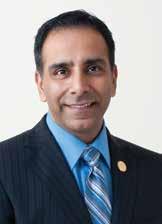
kids, teenagers, and adults are glued to their screens. I see us evolving with curved necks—sadly that could be our future. At a lined-up bus stop, see how many waiting riders have heads down, eyes glued to a 6”x3” screen. Some pedestrians in crosswalks are checking how many likes their recent posts got. Honk at them, you know, just to say Hi . . .
With the large screens at our desks, we need to ensure our eyes are level with the screen and we’re not tilting our heads much up or down. You can adjust your seat height but setting the monitor

height is best. Some monitors come with stands that height-adjust. If your monitor has standard VESA four small mount-holes in back, you can mount the monitor on an arm that has adjustment for height, tilt, angle, and the ability to rotate. I use a two-monitor system, supported by a two-monitor arm bracket. My main monitor is landscape mode, like a TV, the second is rotated in portrait mode, like a cell phone. Windows and Apple computers have display settings that easily allow the rotation of one or more monitors 90 degrees or 180 degrees.
My mouse cursor moves from one monitor to the other as if they are one large monitor, not two. My main monitor is in front of me, the other is slightly to the left. Once the monitors are mounted, the display settings can be adjusted so the cursor moves in a perfectly vertical line from left to right.
The two-monitor setup allows me to copy and paste data between two separate documents; the portrait mode displays a full page at a time, especially legal-size pages. Laptops
The 2023 Mazda CX-50 brings a unique, stylish shape to the SUV segment. Five inches longer than Mazda CX-5, CX-50 provides one of the best driving experiences in a top-quality-finished vehicle.

Inside, the glass provides great visibility. Technology, via the 360 degree camera and large centre console screen, further ensures you can see safely all around.
touchscreen. Cell charging is via a wireless pad.
Seats are fine leather; trim materials throughout the Premium Plus and lower models offer the same quality.
The Kensington SmartView Organizing Laptop Riser is a great way to optimally position your portable. Choose the height from 3 to 4 different levels, then add an external mouse and keyboard.

The sophisticated all-wheel drive system is Mazda’s Skyactiv-G 2.5 DOHC 16-valve in-line 4 cylinder, with 187hp @ 6000 rpm in the GS/ GT variants. Optional for the GT is a Skyactiv-G 2.5 Turbo with Twin Scroll Turbocharger, DOHC 16-valve in-line 4 cylinder with 256jp @ 5000 rpm (with 93 octane fuel)— ample power for local or highway jaunts. Fuel economy with CX-50 is an average of 9.8L/100km. Mazda’s six-speed automatic, two gears less than most others, has no lack of power.
All but the base CX-50 come with a 10.3” display that relies on a centre-console physical knob and buttons. Oddly, Apple CarPlay and Android Auto can be navigated by

The CX-50 is handsomely equipped on the safety front. Every trim comes standard with full-speed adaptive cruise control, lanekeep assist, automatic emergency braking, and blind-spot monitoring with rear cross-traffic assist. If you choose Premium Plus, Mazda adds rear automatic emergency braking, Traffic Jam Assist, and steering intervention for the blindspot monitor.
Off-road, CX-50 handles itself well. Terrain-control modes lend a hand. Your gear, up to 1588kg, can be towed behind you. s www.mazda.ca

MSRP 2023 CX-50
GS-L $38,250
Akash Sablok is a BC Notary with the AJAC designation from the Automobile Journalists Association of Canada.
Trevor Todd will soon visit Iraq, Arabia, Dubai, Kuwait, Qatar, Bahrain, and Oman.


Going to Iraq will mean he has been to the “Axis of Evil.” Trevor travelled to North Korea three times and to Iran ages ago.



A simple action today can have a lasting impact on the future health of kids. One clause in a Will is all it takes. Will you? Let your legacy lead the way for your clients.
Learn more at bcchf.ca/legacy

At Stewart Title, we take pride in working with Notaries. Since our inception into the Canadian marketplace, we have partnered with Notaries to offer peace of mind to your clients and our policyholders. Our comprehensive title insurance coverage for buyers, owners and lenders is competitively priced and backed by solid underwriting expertise and claims paying ability.
We support your role in real estate transactions. You understand the complexities of each transaction and are in the best position to advise clients and represent their interests. We understand the best ways to mitigate risk. Our team leverages a broad pool of knowledge to guide you through your transactions and keep them moving smoothly.
One of the keystones to this partnership is our local Business Development Team. Our team is available to answer questions about our products and coverage and to provide unique solutions for your more complex transactions. They support your practice by training new staff on procedures, best practices, the ordering process or setting up and demonstrating our time-saving applications. They’ll also keep you up-to-date on new developments and provide materials to help educate your clients.
Contact a member of our Team to learn more.
Amanda Magee Director, Business Development 604.839.4471 amanda.magee@stewart.com

Brett Horton Counsel & Director, Commercial Business Development - BC 604.349.0845 brett.horton@stewart.com


Jessica Orlowski Okanagan 250.718.7611 jorlowski@stewart.com



John Gellard Vancouver 604.376.4709 john.gellard@stewart.com
Michelle Wells Tri-Cities, Fraser Valley 604.657.6730 michelle.wells@stewart.com
Nicole McLellan
Vancouver Island 250.588.8996 nicole.mclellan@stewart.com